The Legislature is on recess. We’re keeping an eye on political news across the Golden State here.
Bookmark latimes.com/essentialpolitics to always find our latest news feed.
Or visit thinks links to find news feed items from late February here, updates from early February here, and January’s politics news feed here.
Make sure to follow us on Twitter for more, or subscribe to our free daily newsletter and the California Politics Podcast.
- Share via
Thanks to Trump, these House Democrats from California can breathe easier
If Donald Trump or Ted Cruz is at the top of the ticket for the Republican Party come November, Rep. Pete Aguilar (D-Redlands) can take a bit of a breather.
A new analysis by the nonpartisan Cook Political Report, which handicaps U.S. House races, shows seats held by Aguilar, Rep. Jim Costa (D-Fresno) and Rep. Raul Ruiz (D-Palm Desert) were upgraded from “likely” to “solid” Democratic seats, thanks to their heavy Latino population.
Cook defines “likely” seats as those that are not currently competitive but that have the “potential to become engaged.”
That should be welcome news for Aguilar. He edged out his Republican opponent in 2014 by just 51.7% to 48.3% despite outspending him and benefiting from a Democratic advantage of 6 percentage points among registered voters in the district.
“As long as Trump or Cruz is the GOP nominee, this 52% Latino district is not going to be voting for a Republican,” writes Cook Report House editor David Wasserman.
Trump and Cruz could also affect the races for seats held by two Republicans in the Central Valley, Rep. Jeff Denham of Turlock and Rep. David Valadao of Hanford, as well as freshman Rep. Steve Knight in north Los Angeles County.
Those districts still lean Republican, according to Cook’s rankings, but Trump and his polarizing comments on Mexican immigrants could cause problems for the incumbents.
“The heavier the drag from the top of the ticket, the more expensive these types of seats will be to defend,” Wasserman said.
- Share via
Politics podcast: California’s relevance in the Republican presidential primary
Few would have ever predicted that California, one of the most reliably Democratic states in presidential politics, would play a major role in the 2016 contest on the Republican side.
And yet, that’s exactly what looks to be in store come June 7.
On this week’s California Politics Podcast, we take a closer look at the fascinating inside dynamics of how Donald Trump, Texas Sen. Ted Cruz, and Ohio Gov. John Kasich may be clamoring for delegates in some of the most politically liberal parts of the Golden State.
We also examine the implications of a late entry into the U.S. Senate race by Republican Ron Unz. And we discuss the power-sharing proposals of Assembly Speaker Anthony Rendon (D-Paramount).
You can subscribe to our weekly podcast on iTunes.
- Share via
This Inland Empire Republican wants a GOP presidential debate in San Bernardino
Now that California voters will play a larger role in choosing both the Democratic and Republican presidential nominees, another local politician is calling for his party’s candidates to debate in San Bernardino.
First Rep. Pete Aguilar (D-Redlands) sent a letter to the Democratic National Committee last month asking that the city be considered as a host for a scheduled May debate in California between Hillary Clinton and Vermont Sen. Bernie Sanders.
Now Paul Chabot, a Republican military veteran who is challenging Aguilar, is asking the Republican National Committee to bring the remaining GOP presidential candidates to San Bernardino, where 14 people where killed last December in the deadliest terrorist attack on U.S. soil since Sept. 11.
In a letter to RNC chairman Reince Priebus, Chabot wrote that the city “could have used a strong Republican president to avoid the attack we suffered.”
“We have a unique opportunity to make sure that the communities affected by the attacks on December 2nd understand that a Republican president will fight for their protection, not drop-in after an attack on his way to Hawaii,” Chabot wrote.
Seventeen other politicians and local groups joined Chabot’s call for a GOP debate, according to his campaign.
Asked to comment on whether the RNC is considering the request, a RNC spokesman referred to the online schedule of debates which does not include a future California debate and did not answer further questions.
Chabot shouldn’t get his hopes up: Fox News canceled a debate scheduled for Monday in Salt Lake City after Donald Trump and Ohio Gov. John Kasich. both declined to participate.
“I think we’ve had enough debates,” Trump told Fox News. “How many times can the same people ask you the same question?”
Also not a plus: Chabot misspelled Priebus’ first name in the letter calling the chairman, “Rince.”
Chabot narrowly lost a 2014 contest against Aguilar to represent the then open 31st Congressional District seat and is angling for a rematch. He has made his career in the military and law enforcement the center of his campaign.
Two other Republicans, economist Sean Flynn and former Congressman Joe Baca, are also hoping to make it out of a top-two June primary.
Baca, a former Democrat, had previously said he was retiring from politics after losing two congressional bids in a row and suffering a landslide loss when he ran to be mayor of Fontana.
- Share via
Trump is tops in ballot placement in California
- Share via
There’s no California comparison to Donald Trump
Two things should be debunked about Donald Trump: One is that he’s the new Arnold Schwarzenegger. Another is that he’s continuing what was started by another California governor, Pete Wilson.
I’ve read and listened to these comparisons in some news media recently and they’re simply stretches of baloney.
- Share via
Interior secretary coming to Northern California for momument dedication
- Share via
Federal employees reminded it’s OK to use Uber, Lyft

The General Services Administration will remind government agencies that federal regulations allow employees to use ride-sharing services such as Uber and Lyft on government trips.
The General Services Administration “will continue to monitor trends in the travel industry, including the use” of ride-sharing services, Associate Administrator Lisa A. Austin wrote. “These trends can lead to opportunities for the government to take advantage of new technology and innovation that will increase efficiency and avoid costs.”
Each federal agency gets to decide whether its employees can use the services, according to a letter announcing the reminder.
In mid-February, Reps. Darrell Issa (R-Vista) and Eric Swalwell (D-Dublin) asked the agency to instruct federal agencies to issue a guidance that using the services is permitted, encouraged and reimbursable.
Issa and Swalwell are co-chairmen of the House Sharing Economy Caucus. Uber and Lyft, the best-known ride-share services, are based in San Francisco.
California’s 228,000 state employees can be reimbursed for the cost of using the services for business travel under legislation signed in October by Gov. Jerry Brown.
- Share via
Sen. Dianne Feinstein wants better earthquake building standards
Sen. Dianne Feinstein (D-Calif.) called on the Commerce Department and Federal Emergency Management Agency to provide detailed guidelines for federal agencies to comply with the Obama administration’s recent executive order on earthquake preparedness.
In a letter to the agencies, Feinstein also urged them to develop a plan to upgrade seismic-safety standards to encourage that buildings be designed for post-disaster occupancy.
“Saving lives must be the first priority of building codes. However, if buildings are damaged so badly as to be unusable after an earthquake, it could cripple a city like San Francisco for years,” she wrote.
A recent study found that two of Southern California’s most active faults could rupture together in a magnitude-7.5 earthquake, right through some communities east of Los Angeles that haven’t retrofitted buildings.
- Share via
California delegation votes along party lines on immigration brief
California’s 53-member House delegation voted along party lines Thursday on a resolution that allows Speaker Paul D. Ryan (R-Wis.) to file an amicus brief on behalf of the entire House chamber opposing President Obama’s immigration orders.
The resolution was approved by a 234-186 vote, with five Republicans voting against.
The Supreme Court is scheduled to hear oral arguments Friday in a case challenging President Obama’s immigration executive actions. A decision will probably come right before the court ends its current session in late June.
Texas and 25 other states are seeking to nullify Obama’s Deferred Action for Childhood Arrivals program, which defers deportation for certain immigrants who came to the United States as children, and his Deferred Action for Parents of Americans and Lawful Permanent Residents program, which defers deportation for their parents as well.
Reps. David Valadao (R-Hanford) and Jeff Denham (R-Turlock), who have supported immigration reforms in the past, said they voted in favor of filing the brief because the president’s executive actions went too far.
“This amicus brief is not about the issue of immigration. Nor is it about this president. It is about ensuring that the United States remains a government of the people, by the people, and for the people, regardless of whether Democrats or Republicans maintain control,” Valadao said in a statement.
“President Obama’s attempt to go around Congress cannot stand. Not only does his action damage our ability to accomplish meaningful reform, but if left unchecked it allows future presidents to expand actions or reverse them altogether,” Denham said in a statement.
Last week, House Democrats — including all 39 in California’s delegation — filed their own amicus brief supporting the president.
Reps. Karen Bass (D-Los Angeles), Ted Lieu (D-Torrance) and Loretta Sanchez (D-Whittier) did not vote. Staffers for each member said they would have voted no and plan to insert a statement in the Congressional Record saying so.
Bass was on a conference call, Lieu was flying to California to welcome the president of Taiwan and Sanchez had a family emergency.
- Share via
California Democrats start delegate selection for Philadelphia convention
- Share via
Ron Unz, champion of English-only education in California, jumps into the U.S. Senate race
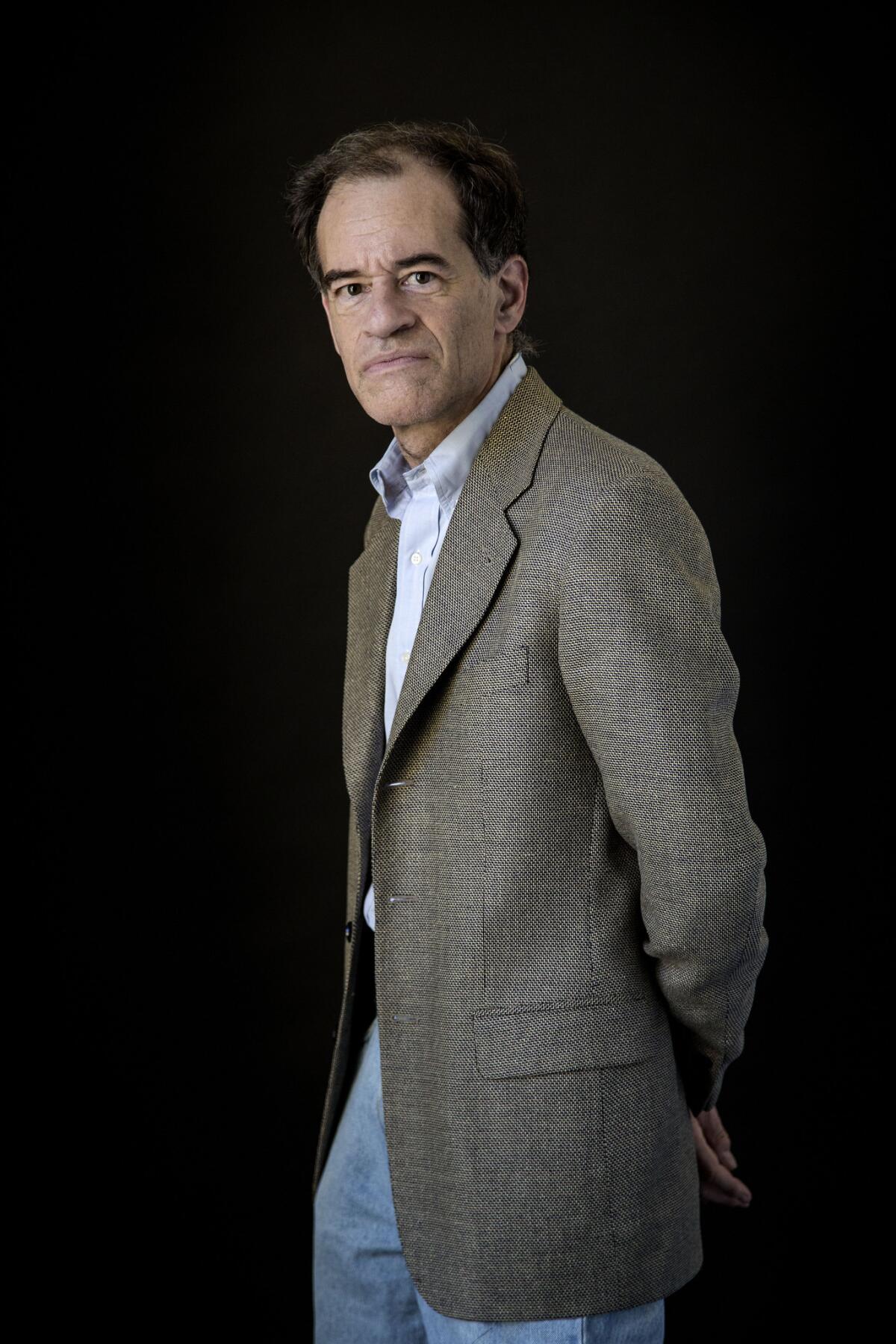
Ron Unz, who ran unsuccessfully in a Republican primary against Gov. Pete Wilson in 1994 and championed a 1998 initiative to end bilingual education, said on Wednesday that he’s running for California’s open U.S. Senate seat.
Unz, who lives in Palo Alto, called it an “absolutely, last-minute decision.”
Unz led a short-lived initiative campaign in 2014 to increase California’s minimum wage to $12, and said the Senate campaign will give him another chance to “raise a lot of issues.”
He said one of the main reasons he jumped into the race was, in part, the California Legislature’s effort to repeal his 1998 initiative, Proposition 227.
Lawmakers have placed a measure on the November ballot to repeal the remaining provisions of the bilingual initiative, as support grows for promoting the teaching of two languages in dual-immersion classes.
“It’s absurd,” said Unz. “It’s a very negative statement about politics in California.”
Unz, who became wealthy in the software industry, said he plans to seed his campaign with $50,000 to $100,000 of his own money. He will also seek political donations, but with a cap of $99.
Unz, who filed for office this week in Santa Clara County, said he is well aware that Democrats hold a daunting advantage over the GOP in voter registration in California, and that it has been almost a decade since a Republican won a statewide general election.
“It’s not like I give myself a great chance of winning,” he said.
Democrats Atty. Gen. Kamala Harris and Rep. Loretta Sanchez of Orange are the current front-runners in the race to succeed the retiring Barbara Boxer in the U.S. Senate. The top Republicans in the race are George “Duf” Sundheim and Tom Del Beccaro, both Bay Area attorneys who served as chairmen of the California Republican Party.
Under California’s top-two primary system, the two candidates who receive the most votes in the June primary, regardless of party, will face off in the general election.
- Share via
L.A. City Council president says Donald Trump is preying on voters’ fears
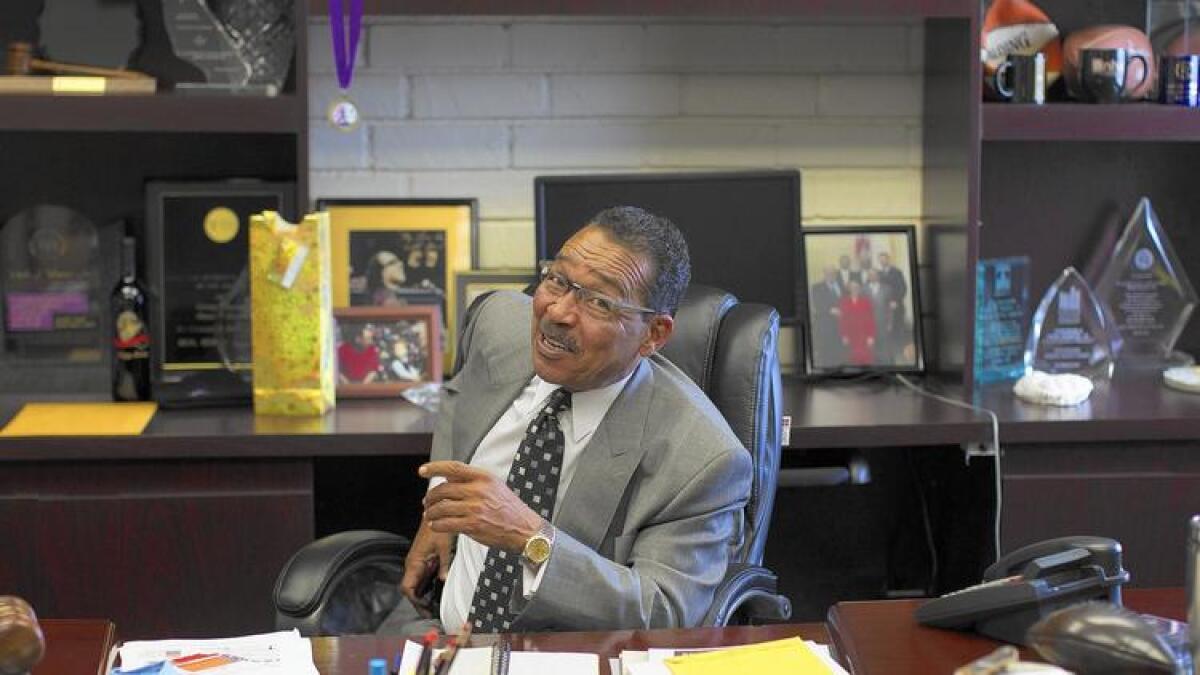
In case there was any question, the president of the Los Angeles City Council is not a fan of Republican presidential candidate Donald Trump.
When Herb Wesson was reelected as council president last summer, he said one of his priorities would be to improve race relations in Los Angeles. Speaking to the Los Angeles Current Affairs Forum on Wednesday, Wesson said he believes speaking out about race and racism is the only way to achieve progress.
“When I was a kid, you couldn’t go on a college campus and not be part of a conversation about race relations,” he said.
He then took aim at the GOP front-runner.
“I don’t have a problem with the Republicans, but what I do have a problem with is how can you lead the greatest country in the world -- and you’re dividing,” he said.
“You’re taking everything that people are afraid of and making it an issue,” he said.
What’s more, he said, Trump is inciting those who are struggling and encouraging them to blame others: “You’re taking a percentage of people whose life is [miserable] and they blame their life on somebody else, and you prey or play to that.”
The strategy is working on voters, Wesson said.
“That’s a smart man, but I don’t know if he has a soul,” he said, laughing.
Wesson has endorsed Hillary Clinton for president. The California primary is set for June 7.
- Share via
National Democrats hope Trump can help turn Steve Knight’s House seat blue
Democratic party leaders were all but jubilant Wednesday over the potential down-ballot effect Donald Trump’s ascent could have as he continues to make strides toward securing the Republican Party presidential nomination.
One seat that Democrats are bullish on turning blue this fall is California’s 25th Congressional District, a seat held by first-term Republican Rep. Steve Knight of Lancaster.
Speaking at a news conference Wednesday, Democratic Congressional Campaign Committee Chairman Rep. Ben Ray Luján of New Mexico said the seat is “on our battlefield now in a very aggressive way.”
Matt Rexroad, Knight’s political consultant, said he had no comment on Luján’s statement and that Knight has not endorsed a candidate.
In January, Knight told the Santa Clarita Valley Signal that he didn’t think Trump “could win the general [election] in a million years.”
Over the last year, national Democrats have expressed interest in ousting Knight, who previously represented the north Los Angeles County area in the state Senate and in the Assembly. In his statement, Luján mentioned one of Knight’s Democratic opponents, first-time candidate and attorney Bryan Caforio. He has racked up several endorsements from California’s Democratic congressional delegation and the Los Angeles County Young Democrats.
He has also attacked Knight for his slow response during the early days of the Porter Ranch gas leak.
Missing from Lujan’s remarks was the other Democrat in the race, LAPD Lt. Lou Vince, who won the state party’s nomination last month but has struggled to raise money and obtain support beyond local grassroots activists.
The district that stretches from Simi Valley to Lancaster and is almost evenly split between Democrats and Republicans, with 21% of voters listing no party preference.
- Share via
L.A. County prosecutors group opposes Lt. Gov. Newsom’s gun control initiative
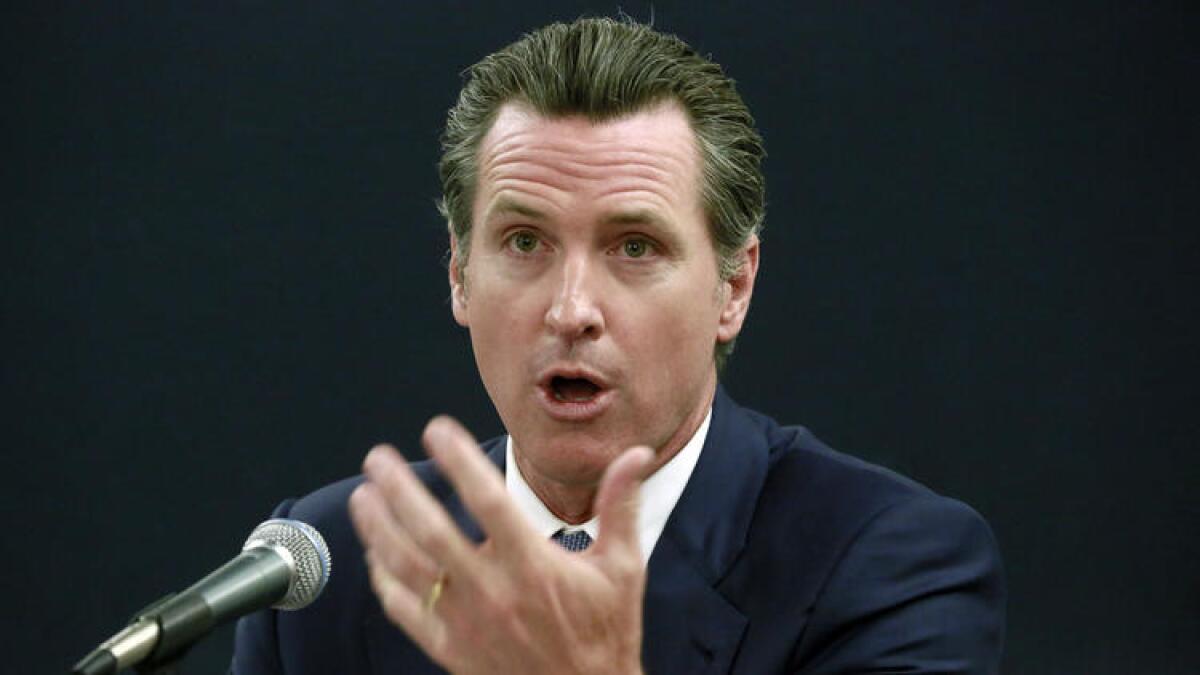
An association representing Los Angeles County prosecutors is set Thursday to become the second criminal justice group in a week to oppose a ballot measure by Lt. Gov. Gavin Newsom that would further restrict guns and ammunition in California.
In a letter to be released Thursday, the Assn. of Deputy District Attorneys for Los Angeles County joins the California State Sheriffs Assn., which earlier announced opposition to Newsom’s “Safety for All Act of 2016.’’
ADDA President Michele Hanisee said California already has the strictest gun laws in the nation and its requirements that guns be registered “have done nothing,” according to a copy of the letter obtained by The Los Angeles Times.
She said that as a prosecutor she has never seen a gang member register the gun he used in a violent crime. Newsom’s measure, which must qualify for the ballot through the signature collection process, would require background checks for those who buy ammunition and ban possession of large-capacity magazines.
“Like other misguided efforts before it, this initiative would make it prohibitively difficult for responsible gun owners to obtain ammunition to use in their firearms for sport, target and home defense,” Hanisee wrote. “It would do nothing to stop criminals from getting ammunition or larger-capacity magazines. The actual result is that it further incentivizes the criminals to commit residential burglaries and armed robberies of gun stores.”
The sheriffs said in a previous letter that the initiative would not stop criminals from getting guns and ammunition on the black market. That letter was signed by Amador County Sheriff Martin Ryan, president of the association.
Gun-owner groups have accused Newsom of using the initiative to advance his campaign for governor in 2018.
Dan Newman, a spokesman for the initiative campaign, said Wednesday that the measure would improve public safety and clarify a law that makes stealing a gun a felony.
“It’s common sense — taking large-scale military-style magazines off the streets and preventing dangerous criminals from having guns and ammo will help law enforcement professionals protect the public,” Newman said.
- Share via
California members seeking Arlington burial for female WWII pilots
Only Congress can change the Army policy that keeps female World War II pilots out of Arlington National Cemetery, acting Secretary of the Army Patrick Murphy said Wednesday.
Exemptions could be made on a case-by-case basis, Murphy told the House Armed Services Committee, but the 1977 law that granted veteran status to women was unclear about burial at Arlington National Cemetery, he said. Burial of female veterans is allowed at other veterans cemeteries.
“I know it is not the answer you want to hear, but that’s the answer,” Murphy said.
Murphy’s answer didn’t satisfy several members of Congress and the family of one of the pilots, who voiced their frustration in a news conference after the hearing.
“If they are not going to do it, we’re going to make them do it,” said Rep. Martha McSally, an Arizona Republican and former Air Force fighter pilot.
Minnesota Sen. Amy Klobuchar said Congress can’t change history, but said it is “able to change how these great women are honored. This is just something that has to happen.”
Murphy said he supports legislation to make the change.
“Congress needs to change what Congress did in 1977,” he said. “I can’t change it unilaterally. ... The commander-in-chief can’t.”
About 1,000 female pilots served stateside during World War II in the WASP program to free up male pilots for combat.
They flew more than 60 million miles domestically, and handled test flights, repaired military aircraft and ferried male officers around the country. They even towed targets during live-ammunition training. Thirty-eight died while serving.
In 2002, Arlington National Cemetery’s administrator said that those who served in the WASP program were eligible for full military honors upon being buried there, and that the women had been eligible for burial there since 1977. But last year, the secretary of the Army overturned that decision, saying it was wrong.
The family of pilot Elaine Harmon refused to accept that edict after Harmon’s will instructed that she wanted to be buried in Arlington. The Army’s decision came shortly before Harmon’s death at 95, and her ashes remain on a shelf in her daughter’s closet in Maryland.
Erin Miller of Maryland said her grandmother wouldn’t believe there is still a fight over whether the pilots were veterans 70 years after World War II.
“I’m still dealing with this problem, and she’s not even here anymore,” she said.
The Harmon family started a Change.org petition that now has more than 170,000 signatures and drew the attention of McSally and other members of Congress.
Rep. Susan Davis (D-San Diego) said Wednesday she’s never seen so many House colleagues rush to sign on to co-sponsor legislation as when she explained who the Women Airforce Service Pilots were and pointed out the Army’s refusal to allow their ashes to be placed in Arlington National Cemetery.
“All of these women were very patriotic and wanted to serve their nation in any way possible,” she said. “This one should be easy.”
So far, 180 members — including 17 Californians — have joined Davis in sponsoring the Women Airforce Service Pilot Arlington Inurnment Restoration Act, which was approved by the House Veterans Affairs Committee in February.
- Share via
In honor of her father, Edward Roybal
- Share via
California lawmaker seeks to slow revolving door between legislating and lobbying
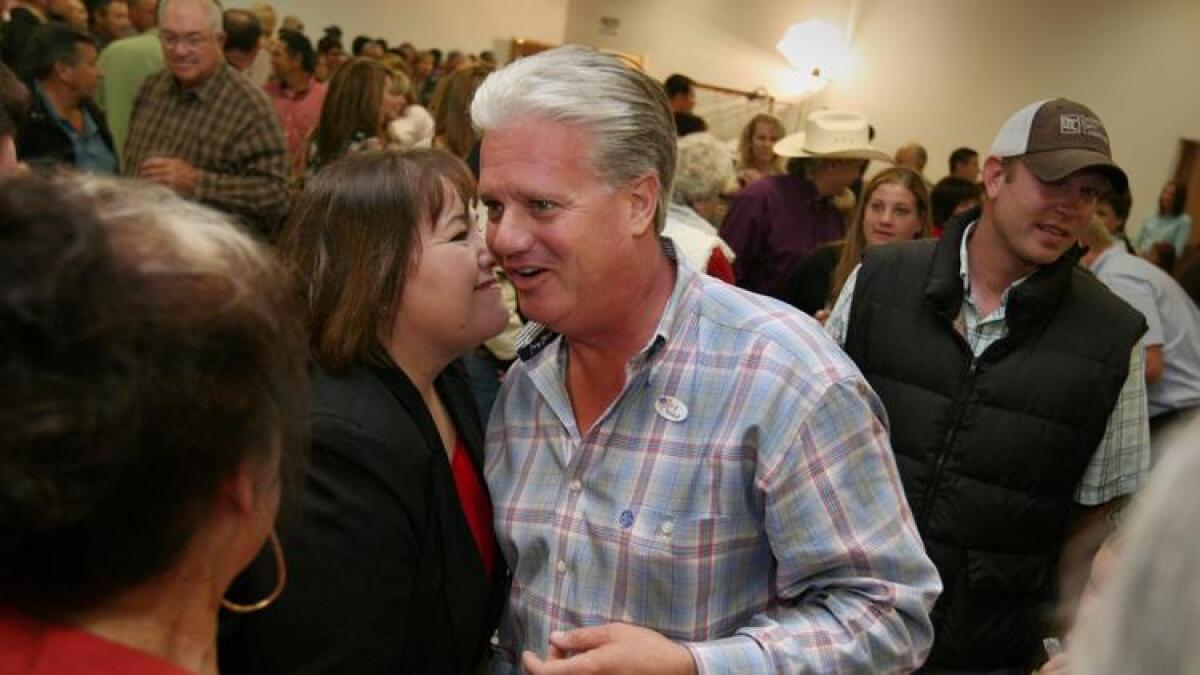
Concerned about lawmakers resigning to join firms seeking to influence the Legislature, state Sen. Andy Vidak (R-Hanford) on Wednesday proposed a change in law to slow the revolving door at the Capitol.
Vidak’s new legislation would extend the ban on legislators leaving and becoming registered lobbyists from one year to at least two years after leaving office, and possibly four years.
Vidak noted that 58 legislators have resigned in the middle of their terms since 1990, forcing expensive special elections to fill the seats. Some special elections have cost counties more than $2 million.
Most left to assume higher office, but several have quit to take governmental affairs jobs with groups that lobby the Legislature.
SB 976 would prohibit legislators from lobbying their former colleagues and the governor until the end of the two-year legislative session that begins after the lawmaker leaves office.
“The longer lobbying ban will discourage legislators from leaving office in the middle of their term to take a lucrative ‘government affairs’ job, which often quickly leads to a lucrative lobbying career,” Vidak said in a statement.
In December, Assemblyman Henry T. Perea (D-Fresno) resigned to become director of state advocacy for the Pharmaceutical Research and Manufacturers of America, better known as PhRMA.
Former Sen. Bill Emmerson (R-Hemet) resigned in the middle of his term in 2013 for a job with the California Hospital Assn., overseeing its team of lobbyists. Earlier that year, former Sen. Michael Rubio (D-Shafter) resigned to take a job directing government affairs at Chevron.
Rubio, Emmerson and Perea are not registered lobbyists.
“Special elections to replace legislators that abandon their seats for the corporate world wind up costing county taxpayers millions of dollars -- money that would be better spent on critical local programs such as public safety, transportation or health,” Vidak said.
- Share via
State Senate leader weighs in
- Share via
Rep. Pete Aguilar urges Democrats to host a debate in San Bernardino
U.S. Rep. Pete Aguilar (D-Redlands) hopes Hillary Clinton and Bernie Sanders forgo the glitz of Hollywood or San Francisco in favor of the Inland Empire when the candidates visit California for a May debate.
Aguilar has asked the Democratic National Committee to host the matchup in San Bernardino, arguing that the economically battered city that was also hit last year by the deadliest terrorist attack in the U.S. since Sept. 11 is “a community that embodies the struggles and concerns faced by people in all parts of the country.”
“San Bernardino is a city that serves as a reminder of the resiliency of the American people and our determination to remain united, even in our darkest of hours,” Aguilar wrote in a Feb. 24 letter to DNC chairwoman Rep. Debbie Wasserman Schultz obtained by the Los Angeles Times.
Eric Walker, a spokesman for the committee, said a decision has not been made about where to hold the California debate.
“We certainly welcome and appreciate Rep. Aguilar’s input,” he said in an email.
In his letter, Aguilar wrote that voters around the country can identify with San Bernardino’s struggles.
The city was hit especially hard during the recession, and its foreclosure rate was 3.5 times the national average. It filed for bankruptcy in 2012.
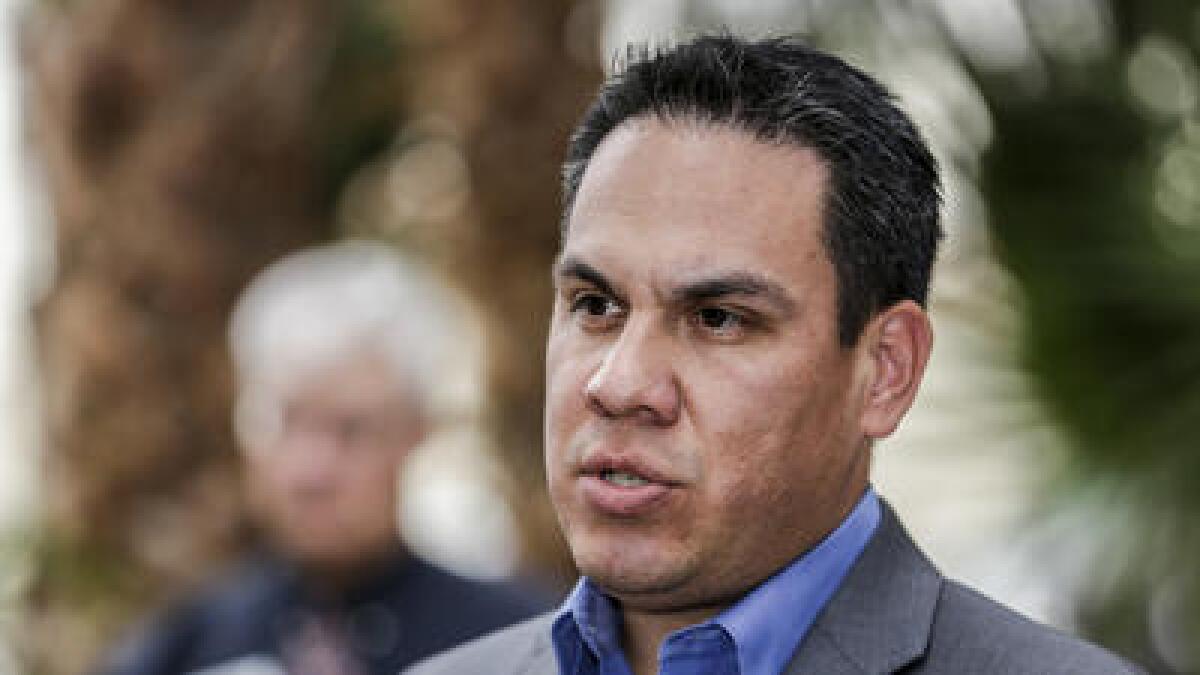
In December, 14 people were killed in the attack on the Inland Regional Center. Aguilar was a constant presence at vigils and funerals in the weeks after the massacre. He led a moment of silence on the House floor.
“While the city of San Bernardino has been forced to confront some of America’s most debilitating problems in the last decade, we have never let it break us,” Aguilar wrote in the letter. “San Bernardino certainly has a storied history, but more than that, it has an unparalleled drive and determination to fight on.”
Aguilar, who was elected to Congress in 2014, represents the 31st Congressional District, which includes San Bernardino and other Inland Empire cities. Aguilar faces a gaggle of Republican challengers in June’s primary, including Paul Chabot, a military veteran who narrowly lost the 2014 race.
- Share via
Assemblyman wants state money for local police body cameras
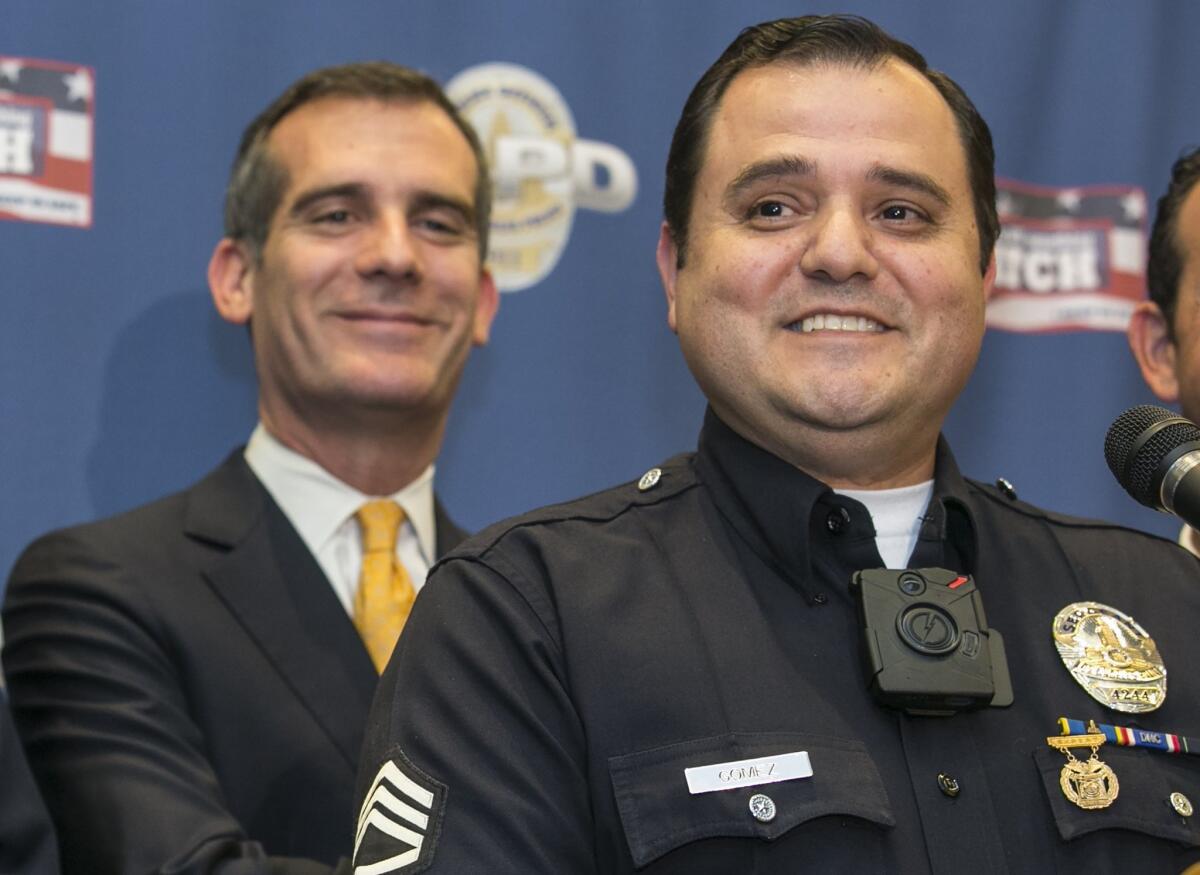
Assemblyman Luis Alejo (D-Salinas) wants the state to lend financial support to local governments that purchase body cameras for their police departments.
“Body cameras will help us address problems of misconduct, absolve officers who’ve been wrongly accused and help the public understand things from a public safety perspective,” Alejo said in a release.
Alejo’s idea is for local agencies to apply for state grants to buy the equipment. It would be paid for through the state’s general fund, but Alejo isn’t sure how much he’ll be asking for yet, his spokesman said.
Some of the state’s largest police departments — including those in Los Angeles and San Diego — already have body cameras. Alejo tried to get a similar bill passed last year, but it died in the Assembly Appropriations Committee.
- Share via
Fewer Sacramento bills will be killed behind closed doors, Speaker Rendon promises
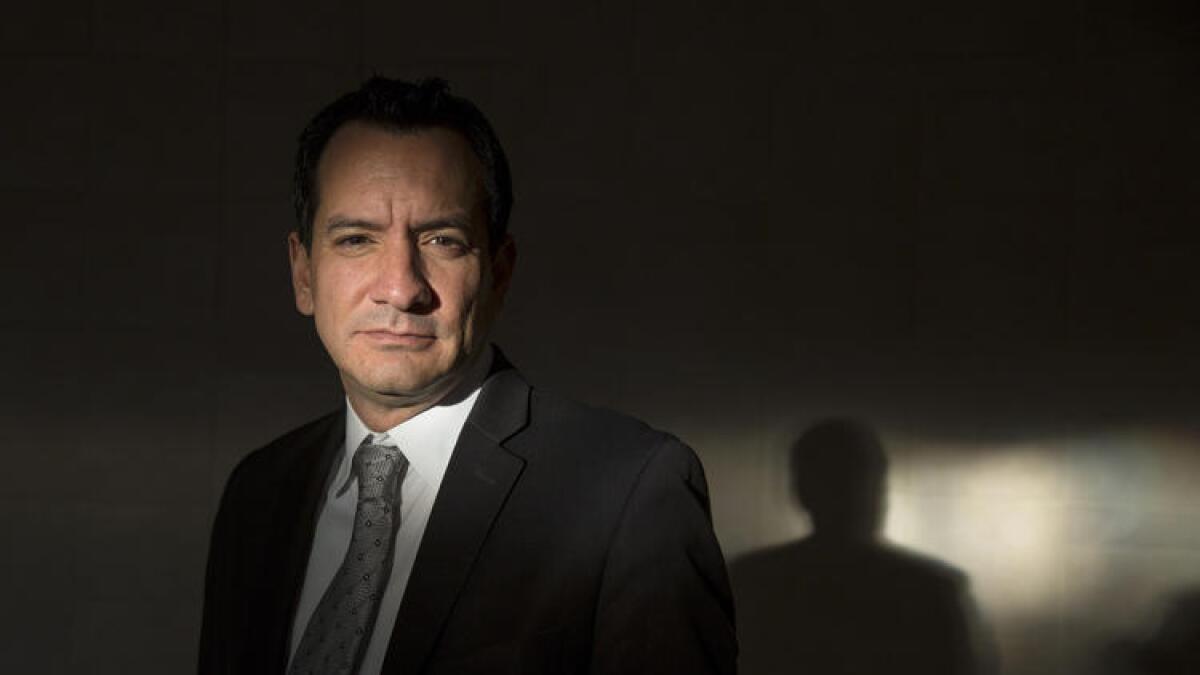
One of the state Capitol’s most notorious practices, quietly killing legislation through use of an appropriations committee “suspense file,” could be diminished under the new Assembly speaker’s efforts to share political power.
In Tuesday’s weekly luncheon of his Democratic caucus, Assembly Speaker Anthony Rendon (D-Paramount) promised that the chairpersons of policy committees will now have significantly more leeway to decide a bill’s fate, rather than always deferring to leaders making deals behind closed doors.
That shroud of secrecy, holding bills back ostensibly because they would cost the state too much money, often allows lawmakers to avoid casting an embarrassing vote in order to curry favor with interest groups.
The announcement that committee chairs would have more power to sift good bills from bad came as welcome news to some of those who attended the private luncheon.
The new Assembly speaker also promised an end to a recent tradition of most decisions being made by a handful of lawmakers, instead promising to bring decisions to the entire Assembly Democratic Caucus.
Rendon, who took office last week, has talked at length about the legislative changes that should accompany the loosened term limits approved by California voters in 2012.
- Share via
Lawmakers defiant of governor’s veto, try again on ‘right-to-try’ bill
More than five months after Gov. Jerry Brown vetoed a bill to allow the terminally ill access to experimental drugs, an Assembly committee began the process on Tuesday of sending almost the exact same proposal back to Brown’s desk.
“This is just about having hope, having another avenue,” said Assemblyman Ian Calderon (D-Whittier) as he brought the proposal back before the Assembly Health Committee.
The new bill, AB 1668, passed on a bipartisan 15-0 vote. It would allow anyone with a terminal illness access to experimental drugs with the approval of two physicians, thus expanding the pool of patients who are able to try such treatments. It would not, however, require drug manufacturers to make the drugs available, and it would not force health plans to pay for the treatment.
Calderon told committee members that it’s only fair to allow terminally ill patients to “swing for the fences” when it comes to saving their own lives. And he was joined by Mike DeBartoli, a former Sacramento firefighter who gave emotional testimony about his diagnosis of amyotrophic lateral sclerosis, or ALS.
In October, Brown vetoed an almost identical measure that had little opposition, arguing that a new federal program is designed to allow more patients access to experimental drugs.
“Before authorizing an alternative state pathway, we should give this federal expedited process a chance to work,” he wrote in his veto message.
Calderon took issue with that position during the hearing. “Terminally ill patients do not have the luxury of waiting,” he said.
- Share via
Rep. Jackie Speier proposes assault weapon import ban
U.S. Rep. Jackie Speier (D-Hillsborough) on Tuesday proposed legislation banning the importation of assault weapons. The proposal came during a speech Speier gives each month in the House in which she reads aloud the names of people killed in mass shootings the month before.
The bill would require the Bureau of Alcohol, Tobacco, Firearms and Explosives to ban the import of assault weapons that are not suitable or readily adaptable for sporting purposes.
“Cheap foreign assault weapons are a favorite tool of cartels, mass shooters and even ISIS, which used guns that had been imported to the United States to carry out the Paris attacks,” Speier said, using an acronym for the Islamic State terrorist organization.
Speier was shot five times during a 1978 congressional fact-finding mission to the People’s Temple encampment in Guyana, the site of the Jonestown massacre.
The photos and names of the 37 people Speier spoke about Tuesday will be added to the wall outside her Washington office in the Rayburn House Office Building.
“These are the faces of Americans gunned down because we lack the guts to do anything about gun violence,” Speier said.
Rep. Scott Peters (D-San Diego) also read the names of shooting victims on the House floor Tuesday.
It’s the eleventh time Peters has gone to the floor since he began reading aloud the names and ages of each person who has died in a mass shooting since the 2012 Sandy Hook Elementary School massacre. He said he will continue to read off names — he has memorialized 238 people so far — until House leaders allow a vote on legislation to address gun violence.
- Share via
No one wants to regulate Uber, says agency head
Someone needs to oversee California’s burgeoning ride-sharing industry, the head of the agency in charge of regulating Uber and Lyft said Tuesday, but he hasn’t found an agency willing to do it.
“The answer I got from all the other agencies that I talked to is, ‘It’s not us, it’s you,’” said Michael Picker, the president of the California Public Utilities Commission, at a state Senate committee hearing.
Picker said his agency, which is also responsible for regulating power companies and other high-profile industries, might not have the capacity to handle ride-sharing.
“Maybe somebody else should do it,” Picker said. “I don’t know who.”
It’s the second time in two weeks that Picker has told a legislative committee that ride-sharing regulation might be too much for his agency.
On Tuesday, state Sen. Ben Hueso (D-San Diego), the chairman of the Energy, Utilities and Communications Committee, jumped on Picker’s comments to push his view that the ride-hailing industry needs more rules, especially when compared with the greater restrictions facing taxi companies.
“You have really competition on an unlevel playing ground,” Hueso said.
Hueso suggested that the PUC audit ride-sharing companies and work with local governments to enhance regulations.
Hueso, whose family owns a large taxi company in San Diego, has refused to schedule votes in his committee on two widely supported bills that would ease ride-sharing rules, saying the industry needs more comprehensive regulation.
Sen. Mike McGuire (D-Healdsburg) also worried that the PUC might be too overburdened to handle ride-sharing.
“As we’ve seen the industry evolve, state government has not evolved with it,” McGuire said.
- Share via
Audit finds many state construction projects over budget and behind schedule
State construction projects regularly take more time than planned and go over budget, according to a report released Tuesday by State Auditor Elaine M. Howle.
Of the 25 projects reviewed for a recent 4 1/2-year period, the Department of General Services Real Estate Division prepared complete cost estimates for only 19, and of those 12 exceeded the division’s initial cost estimate.
The worst case was the construction of a veterans home in West Los Angeles for which the state spent about $115 million more than its initial estimate of about $118 million. The project went over budget primarily because state officials changed its scope, auditors found.
In addition, 17 of the 25 projects reviewed by auditors took longer than planned.
Other factors in cost and schedule overruns included design deficiencies and poor planning.
“Although some of these factors may not have been preventable, we noted that the division could have prevented others if it centrally tracked and analyzed data related to these projects,” Howle wrote to Gov. Jerry Brown.
- Share via
Speaker Rendon, citizen of Rome?
- Share via
Gov. Jerry Brown asks for help on his parole ballot initiative
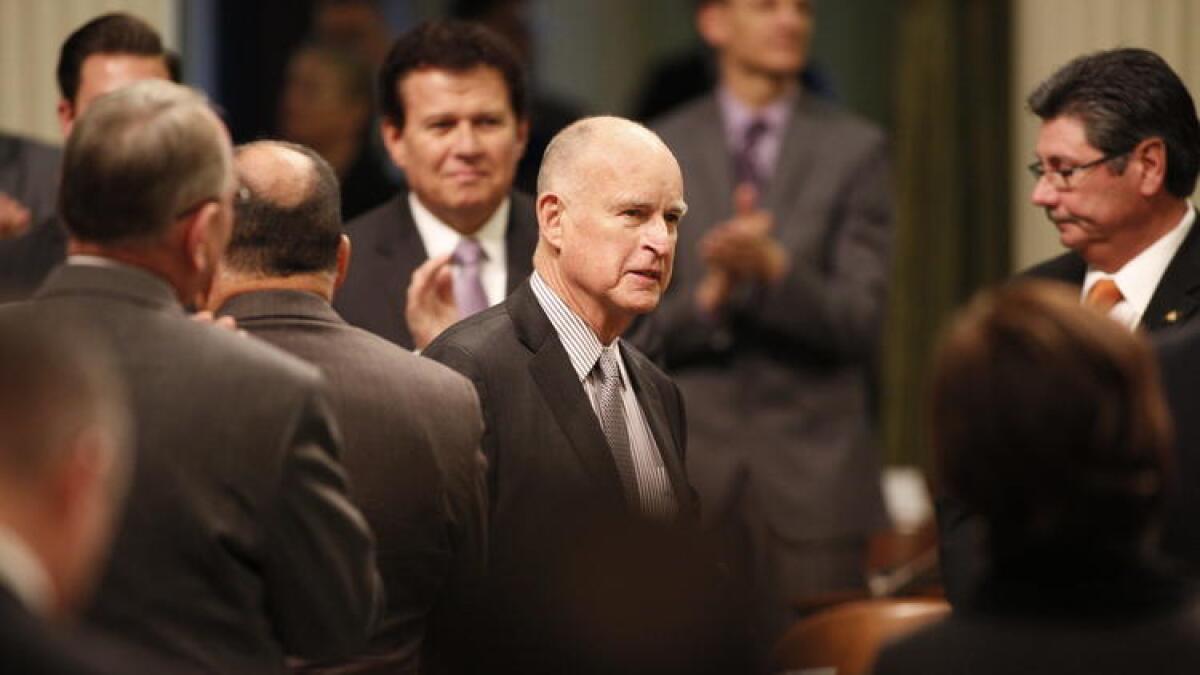
Gov. Jerry Brown doesn’t tweet often, which may be why his simple four-word tweet on Tuesday morning was noteworthy.
The link goes to Brown’s political campaign website, where he’s asking for volunteers to help collect voter signatures on his ballot initiative to revamp prison parole and juvenile justice.
The initiative was cleared for signature gathering, but on a conditional basis. Last month, a Sacramento judge ruled that Atty. Gen. Kamala Harris should not have allowed Brown to submit substantial, late amendments to an existing initiative. The governor appealed to the California Supreme Court, and the justices then allowed signature gathering even as they continue to weigh the merits of the legal challenge.
On his website, Brown argues the initiative’s passage is crucial because “the state does not have a durable plan to deal with prison overcrowding and still faces the prospect of a court ordered release of thousands of inmates.”
Last month, the governor transferred $500,000 from one of his campaign accounts into the parole initiative effort.
- Share via
California Senate memorializes Nancy Reagan
- Share via
RNC to target Feinstein over Supreme Court pick
National Republicans are lining up ad campaigns against Sen. Dianne Feinstein (D-Calif.) and other Senate Democrats for offering to consider whomever President Obama nominates as the next U.S. Supreme Court justice.
Senate Republican leaders have said they won’t hold hearings or meet with a nominee until after the November election. They argue that a president with less than a year left in office shouldn’t make such a consequential decision.
Democrats say that with more than 300 days left in office, it’s President Obama’s responsibility to fill the position rather than leave the court evenly split for at least another session.
Feinstein, who isn’t up for election this cycle, is among the Democrats who have pushed for a hearing.
Obama could name a nominee by the end of the week and Judge Paul J. Watford, a Californian who serves on the 9th Circuit Court of Appeals, is thought to be on his short list.
“We’re going to hold everyone accountable and make sure Democrats have to answer to the American people for why they don’t want voters to have a say in this process,” Republican National Committee Chairman Reince Priebus said in a statement.
An RNC spokesman said that will include petitions, robocalls, and Web and radio ads.
The Senate Judiciary Committee vets Supreme Court nominees, but the Republican Party also plans to investigate Obama’s pick, Priebus said.
“If the president wants to break with decades of precedent by pushing through a nominee in an election year, we’re going to vet that person and put their real record on display,” he said.
Senate Democrats have also criticized Republicans for wanting to postpone the nomination process. They released a video Thursday of Senate Judiciary Committee Republicans, saying that the committee is obligated to consider a judicial nominee, regardless of partisan politics.
- Share via
These California Democrats are headed to Cuba
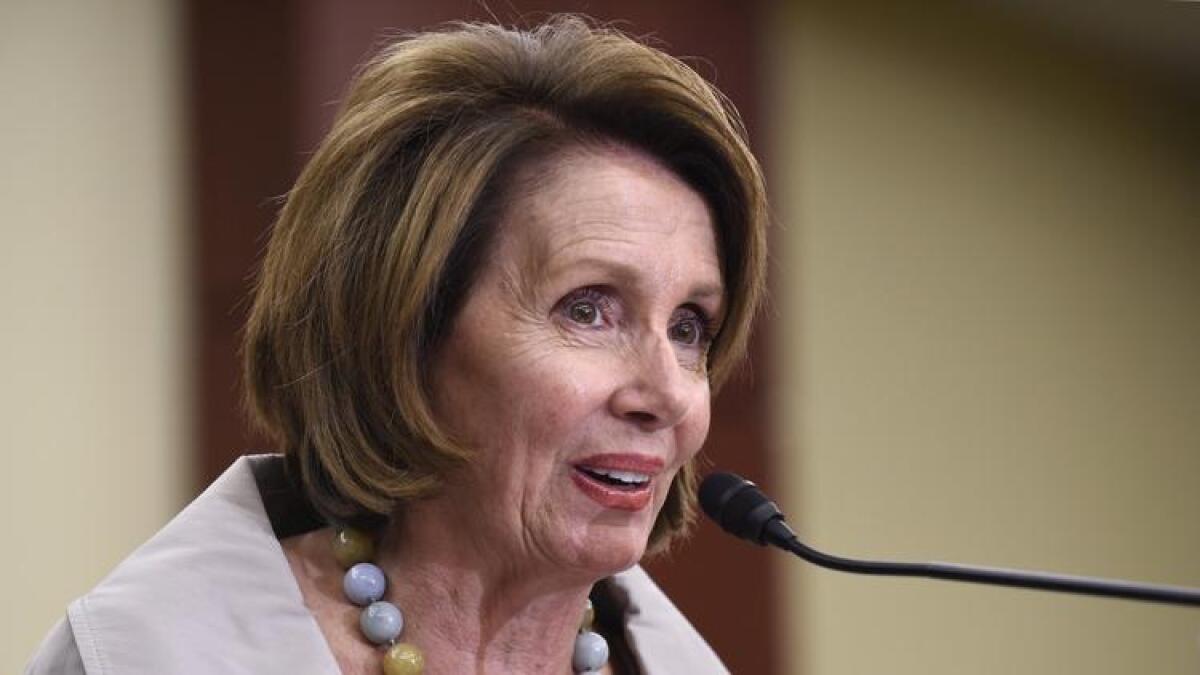
House Minority Leader Nancy Pelosi is leading 16 House Democratic colleagues on a trip to Cuba next week when President Obama visits the island nation.
The San Francisco Democrat will be joined by House Democratic Caucus Chairman Xavier Becerra (Los Angeles) and Reps. Karen Bass (Los Angeles), Sam Farr (Carmel), Barbara Lee (Oakland) and Alan Lowenthal (Long Beach).
Not on the list is Rep. Jerry McNerney, who is hoping Obama pushes Cuba to extradite the man who hijacked a plane he was on 44 years ago.
Obama’s March 21-22 trip is the first visit to Cuba by a U.S. president in more than 80 years.
Staff for several of the California members said the White House approved the Sunday through Tuesday trip, but they are still waiting to learn details about what the congressional delegation will do in Cuba.
Based on information from a Democratic staffer, an earlier version included Rep. Lucille Roybal-Allard (Downey) on the list of Democrats on the trip.
- Share via
House approves Eshoo bill requiring energy-efficient tech strategy
- Share via
Backers of initiative to change campaign and lobbying rules back down, embrace Sacramento solution
Cross one proposed initiative off the list for the very long November statewide ballot.
Convinced that there’s momentum at the state Capitol to make improvements on campaign and lobbying disclosure, a Silicon Valley software entrepreneur and self-styled reform groups decided on Monday to cancel their signature-gathering efforts.
“Things are frozen at the federal level and the action should be at the states,” said Jim Heerwagen, whose spent more than $425,000 in the process of launching his omnibus initiative to require more disclosure of political and lobbyist spending.
But on Monday morning, Heerwagen and his supporters threw their support to legislation by state Sen. Bob Hertzberg (D-Van Nuys) to finance a long-awaited overhaul of California’s campaign finance database. Heerwagen believes two other bills in the Legislature will also achieve the goals of his proposed ballot measure: one to require new disclosure on campaign ads and another to expand the reporting requirements for government lobbying.
The Hertzberg bill, SB 1349, would authorize some $13.5 million for replacing the online Cal-Access campaign finance system. The effort is supported by Secretary of State Alex Padilla, who believes there should be smooth sailing for the proposal in the Capitol.
“Disclosure and transparency is not a partisan issue,” Padilla said at Monday’s news conference.
- Share via
Consumer group calls for resignation of a top Brown aide
The head of Consumer Watchdog called Monday for the resignation of Nancy McFadden, a top aide to Gov. Jerry Brown, unless she provides records showing she recused herself from all decisions involving Pacific Gas & Electric Co., a firm in which she owned stock during her first year in office.
“McFadden has an obligation to show that she recused herself from PG&E decisions or she should step down,” said Jamie Court, president of Consumer Watchdog.
The Times reported on Friday that a former PG&E lobbyist claimed in emails that McFadden was involved in appointments to the state Public Utilities Commission, something the governor’s office denies.
- Share via
After last year’s fight over climate-change legislation, Assemblywoman Cheryl Brown says, ‘They are after me’
Assemblywoman Cheryl Brown (D-San Bernardino) was part of a contingent of business-aligned Democrats who bucked the party line on SB 350 last year, holding back support for the sweeping climate-change bill until a controversial petroleum provision was scrapped.
The provision, which would have slashed California’s motor vehicle petroleum use in half by 2030, was a key piece of Gov. Jerry Brown’s policy agenda and was pushed by Democratic leaders in the Legislature.
Now Assemblywoman Brown, a moderate, is facing what promises to be a bruising reelection fight against an intra-party challenger from the left, attorney Eloise Gomez Reyes.
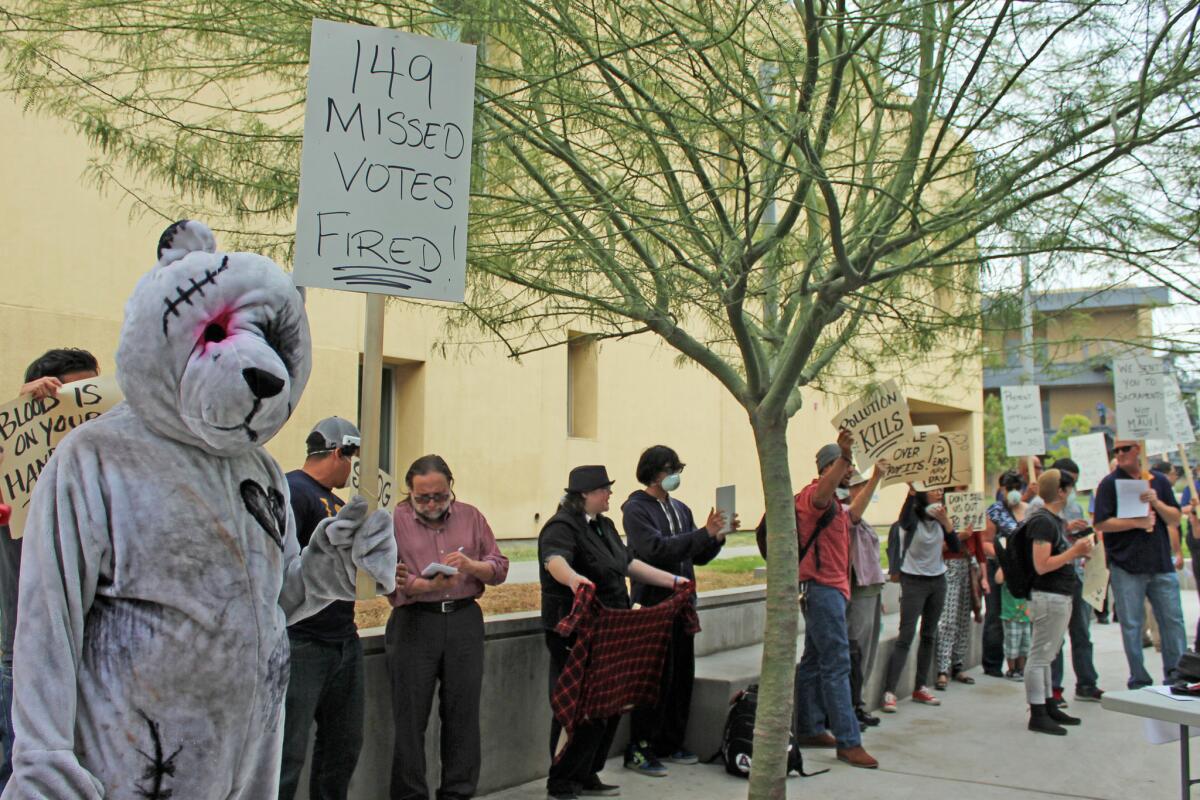
The race raises a question: What does it mean to be a Democrat in San Bernardino, where concerns over jobs often compete with those about the environment?
Some early signs indicate that Assemblywoman Brown could be in trouble. Protesters have shown up at her local events. Some of her supporters have defected, endorsing Reyes early in the fight.
“Do you ever feel that something is not going quite right?” she said in a recent phone interview. “They are after me, and I still don’t know why. I don’t know who ‘they’ are. But I will find out soon.”
In Sacramento, the Democratic establishment has largely rallied around the lawmaker.
But she is no stranger to how California’s “jungle primary” — which allows the top two primary finishers to advance regardless of party — can change fortunes in a hurry.
- Share via
Tobacco politics in this week’s podcast
The political wrangling over a package of closely watched anti-tobacco bills in Sacramento may have revealed some striking differences among Democrats.
In this week’s episode of our California Politics Podcast, we discuss how that wrangling may have its origins in last year’s climate change debate over fuel. And now all eyes are on whether the tobacco industry is mulling a ballot referendum.
We also discuss the broader issues surrounding legislation to address worker rights in the “app economy,” as well as the new leadership team of Assembly Speaker Anthony Rendon (D-Paramount).
You can subscribe for the weekly podcast on iTunes. And be sure to also check out the new Essential Politics Podcast and its coverage of the 2016 presidential campaign.
- Share via
Former GOP state insurance commissioner won’t run for Senate
- Share via
Tobacco industry threatens referendum on smoking bill
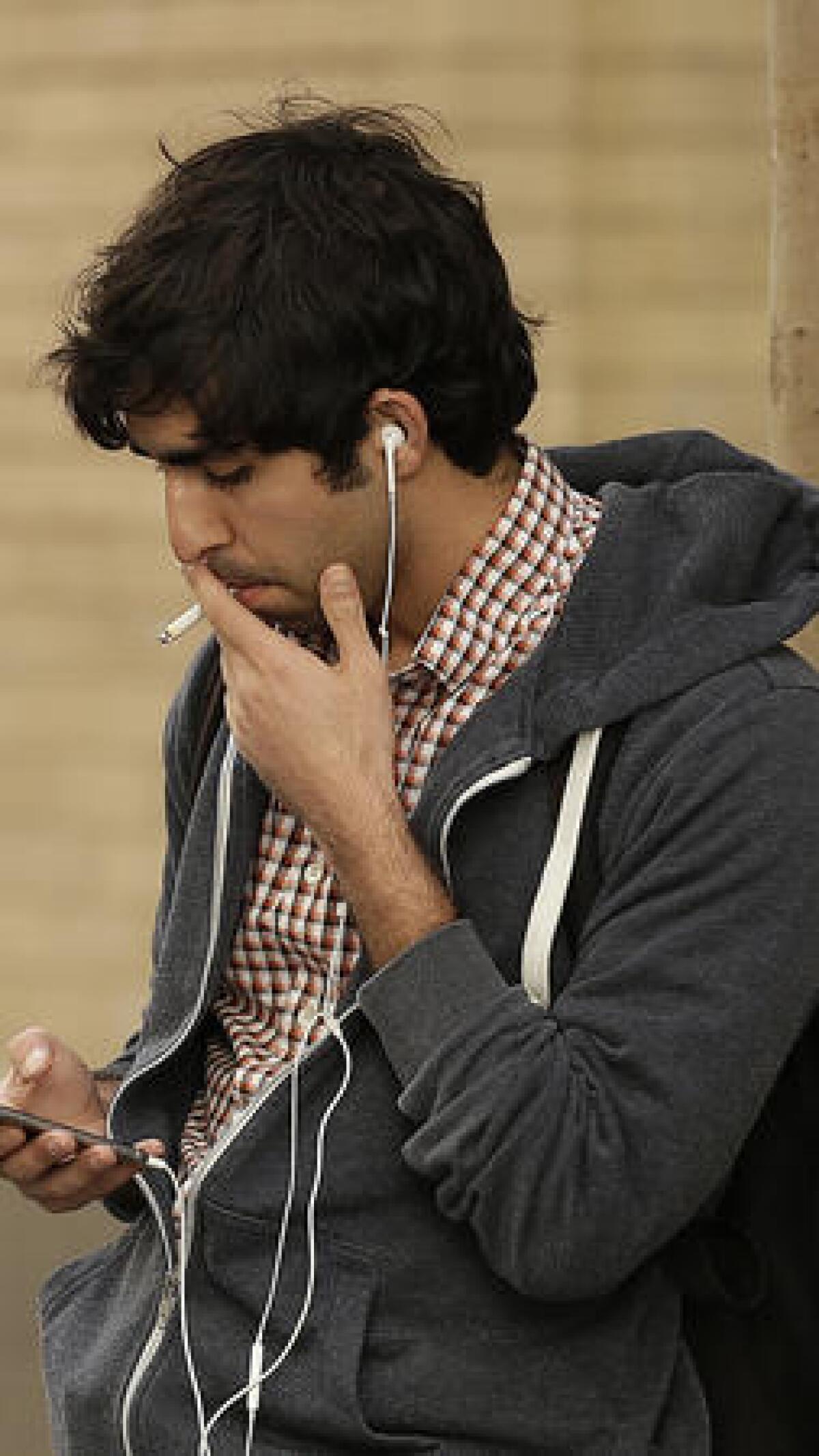
Just days before the Legislature approved a bill that would raise the smoking age to 21, a lobbyist warned that the tobacco industry would file a November ballot referendum to overturn the law if it’s signed by Gov. Jerry Brown, according to a coalition supporting the measure.
The emailed warned that the effort could also derail both the signature drive for a $2 per pack tobacco tax and extension of 2012’s Proposition 30 income tax rates, with the tobacco companies paying a premium to signature gatherers on a referendum.
The Senate gave final legislative approval to the smoking age bill on Thursday.
In a March 2 email to a legislative staffer, lobbyist George Miller, IV wrote,“When we hit the street with a referendum paying $10 per signature, Prop. 30 is dead as well as $2 a pack tax. We will have every signature gatherer on an exclusive. Just letting you know so you can’t say you were not warned.”
Neither Miller, whose lobbying firm represents tobacco giant Altria, nor an Altria spokesman returned requests for comment.
The email was made public Friday by coalition behind the bill, Save Lives California, which includes the California Medical Assn., American Heart Assn., American Lung Assn. and American Cancer Society.
“It should come as no surprise that an industry that targets kids for deadly, lifelong addiction would threaten to undermine their education and healthcare too,” said Dustin Corcoran, CEO for the California Medical Assn. “Nonetheless, this email threat is a clear indication that the tobacco industry will go to any length to protect a business model that relies on getting kids hooked on nicotine at an early age.”
The bill, one of six tobacco control measures approved by the Legislature, has not yet landed on the governor’s desk. When it does arrive, Brown will have 12 days to act. He has not yet indicated a position.
- Share via
Rep. Ed Royce urges Obama to meet with Cuban dissidents
House Foreign Affairs Committee Chairman Ed Royce (R-Fullerton) wrote Friday that he’s concerned that President Barack Obama’s upcoming visit to Cuba “will send the wrong message to Cubans fighting for democracy and human rights.”
In a letter to the president, Royce urged Obama to meet with Cuban human rights activists while on his March 21 trip, including U.S. Presidential Medal of Freedom recipient Dr. Óscar Elías Biscet González, journalist Guillermo Fariñas Hernández, activist Rosa Maria Payá, and the current leadership and members of “The Ladies in White,” an opposition group founded by the female relatives of imprisoned dissidents.
Secretary of State John Kerry recently canceled a visit to Cuba after disagreements over which political dissidents he could meet with while there. Royce wrote that it’s not too late for Obama to cancel as well if Cuban officials won’t approve of the meeting.
“Meeting with these high-level, internationally acclaimed dissidents — and not government-picked ‘activists’ — will assure the Cuban people that America has not forgotten them. Frankly, these meetings should have been solidified well before the White House announced your upcoming visit,” Royce’s letter states.
Obama’s overnight stop in the island nation is the first by a sitting U.S. president in nearly 90 years.
- Share via
Ex-California lawmaker Tim Donnelly to challenge fellow Republican Rep. Paul Cook
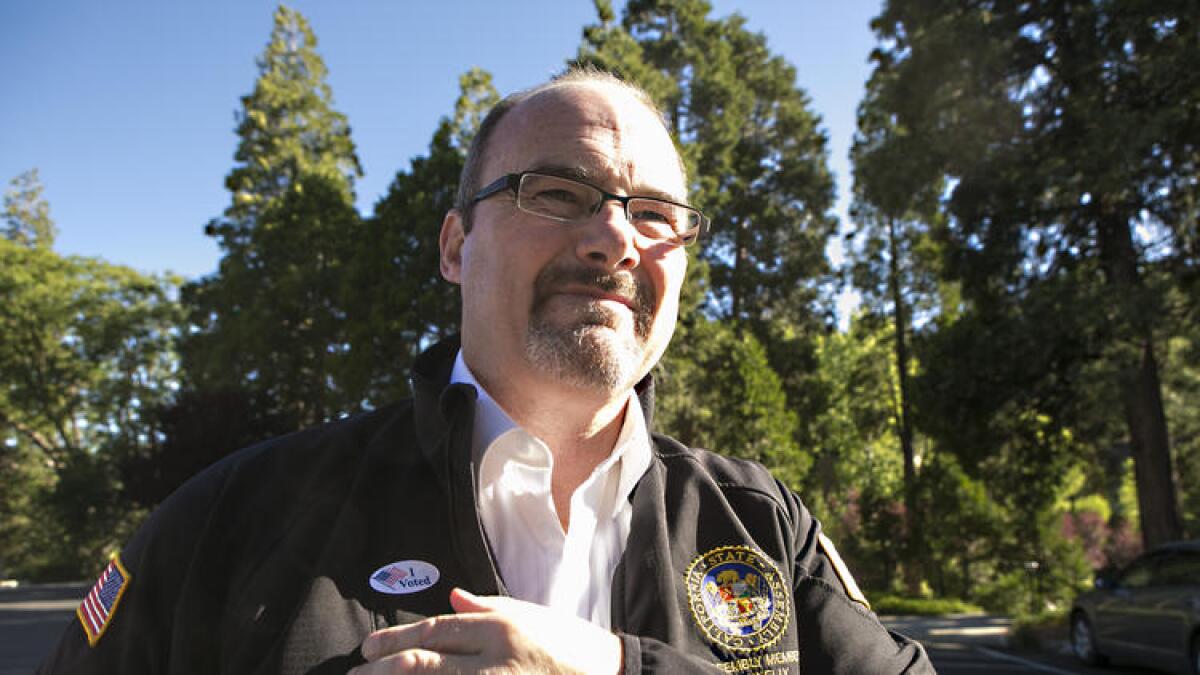
Former Assemblyman and Republican gubernatorial candidate Tim Donnelly is returning to politics to launch a last-minute bid against Rep. Paul Cook (R-Yucca Valley).
Donnelly filed papers Thursday to run in California’s 8th Congressional District, which stretches hundreds of miles along the Nevada border from Mono Lake south to Victorville in the Inland Empire.
Donnelly, a conservative tea party favorite who lives in Twin Peaks near Lake Arrowhead, called out Cook as an “establishment” congressman in a statement Friday. He slammed Cook for voting to pass a federal budget in December that did not include a rider bill suspending the admission of new refugees from Syria and Iraq to the U.S.
“We need a Representative that will stand up for the people of this great district and speak out against the political correctness that has put us all at risk,” Donnelly said in a statement.
After he came in third in the 2014 governor’s primary race behind Gov. Jerry Brown and Republican Neel Kashkari, Donnelly shifted to the radio world.
He hosts “The Tim Donnelly Show” on KIXW-AM (960) from the Inland Empire or, as he puts it, “from deep behind enemy lines in the occupied territory of the socialist republic of California.”
The show’s Friday afternoon broadcast is Donnelly’s last as he launches his campaign. His guests will include conservative writer Michelle Malkin and actor Rob Schneider, who has lobbied against childhood vaccines.
Donnelly spearheaded a failed effort last year to put a referendum on the ballot to repeal a state law that eliminated personal-belief exemptions from the state’s immunization requirements for schoolchildren.
Cook was first elected to Congress in 2012. His office did not immediately respond to a request for comment on the race.
Donnelly could benefit if a Republican presidential nominee has not been decided by California’s June primary. Donnelly was a leader in the Minuteman border-patrol group.
“I suspect he is going to be clutching for Donald Trump’s coattails and hoping that a lot of people turn out whose main issue is the wall,” said John J. Pitney, a political science professor at Claremont McKenna College. “He is one of the very few people alive who could make Donald Trump look like a moderate on immigration.”
- Share via
Voters may decide whether to tax candy and snack foods in California
A California lawmaker suggested Friday that the state reinstitute a sales tax on candy and snack food, adding to the list of proposals on the table this year to address growing health problems by raising taxes on cigarettes, marijuana, vaping and sodas.
Assemblywoman Cristina Garcia (D- Bell Gardens) proposed that voters be asked in 2018 to overturn a 1992 ballot measure that repealed the imposition of a tax on candy, chips, snack cakes and other processed snack items.
Garcia said Proposition 163 was pushed by the food manufacturers industry and labeled the snacks “essential foods.” Restoring the tax with a constitutional amendment would provide $900 million annually to combat health problems caused by consumption of snack foods, she said.
“We’ve seen the results of the explosion of snack food consumption on our society and the negative health repercussions,” Garcia said. “Obesity, diabetes, hypertension, tooth decay, these and so many other conditions are a directly attributable to the poor modern diet made up of high-calorie, ultra-processed foods.”
A recent UCLA study found that 55% of the adult population in California is affected by diabetes, with 33% of young adults being diagnosed as pre-diabetic.
- Share via
Lawmaker who wants more rideshare regulation says he’s going to fail
State Sen. Ben Hueso believes he’s going to lose his bid to beef up regulations on Uber, Lyft and other ridesharing companies.
“Honestly, I don’t believe I can stop this,” Hueso, a Democrat from San Diego, said in an interview this week. “I don’t believe I can influence this. I can bring some more information to the public.”
Hueso, one of the Capitol’s strongest advocates for stricter ridesharing rules, said his colleagues are attracted by Uber and Lyft’s popularity and haven’t grappled with allowing the businesses to face fewer regulations than taxis and other transportation services. Hueso said his experience in the taxi industry has allowed him to see red flags related to public safety and consumer protection that others don’t.
He said he’s also bothered by what he sees as inattention from legislators and regulators on the issue. The Public Utilities Commission is responsible for overseeing ridesharing companies. But this week, the head of the PUC told an Assembly committee that the commission might need to jettison its ridesharing responsibilities because they are too much work.
“I’m just watching this, fascinated, [and] going, ‘What are we doing here as a Legislature?’” Hueso said. “If we are going to allow this business to flourish in our state, we definitely need regulation. If somebody dies, if consumers are not treated fairly, if the employees are not treated fairly, it’s really on our conscience.”
Hueso’s comments came during an interview for an article on his family ties to the taxi industry and why he hasn’t scheduled votes in his Energy, Utilities and Communications Committee for two widely supported bills to ease some ridesharing regulations. His lack of action has put the two ridesharing bills on hold.
Hueso said he was doing nothing improper and implied that the questions about his family ties were an effort to pressure him because of his stance on ridesharing.
“I hope that you weren’t sent here to intimidate me,” Hueso said during the interview. “I hope that you weren’t. Because that happens a lot in what I do. It’s been done before. I hope that you really look at what’s the issue here. I think the media needs to raise a lot of questions about what’s happening here in the Legislature.”
- Share via
The story behind two stalled ridesharing bills
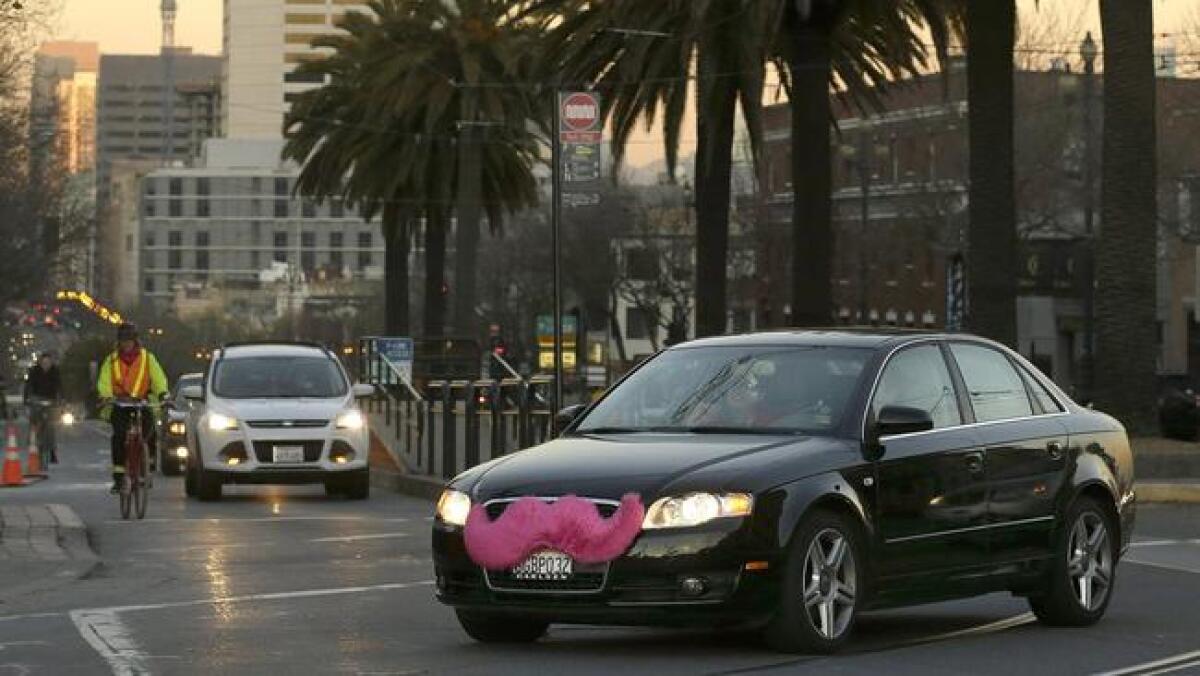
Two bills to ease regulations for Uber, Lyft and the rest of the ridesharing industry are stuck in a state Senate committee after receiving nearly unanimous support in the Assembly last year.
The legislator who chairs the committee is Sen. Ben Hueso, D-San Diego. Hueso has deep family ties to the taxi industry and one of the bills in limbo is directly connected to a lawsuit filed by a taxi company owned by Hueso’s brother.
Hueso, who said he was unaware of the lawsuit, said his motivations have nothing to do with his family but rather concerns about public safety and consumer protection in the ridesharing industry.
- Share via
Three California mayors at South by Southwest
West Sacramento Mayor Christopher Cabaldon, Sacramento Mayor Kevin Johnson and San Jose Mayor Sam Liccardo are speaking at South by Southwest this weekend.
The mayors are participating in panels focused on data and technology.
Rep. Darrell Issa (R-Vista) also will speak on a panel at the festival.
Cabaldon posted this photo Thursday when participating in an education panel.
- Share via
Californians attending State Dinner at White House
House Minority Leader Nancy Pelosi (D-San Francisco) and Rep. Susan A. Davis (D-San Diego) are on the guest list for the State Dinner Thursday evening at the White House.
The dinner recognizes the visit of Canadian Prime Minister Justin Trudeau, who arrived in Washington on Thursday morning.
Singer Sara Bareilles, a Eureka native, will perform after the meal.
Other attendees include actor Michael J. Fox; actress Tracy Pollan; San Francisco restaurateur Jonathan Kaplan; Klein Financial President and Chairman Emeritus of California Institute of Regenerative Medicine Robert Klein II; Saturday Night Live Executive Producer Lorne Michaels; actor Mike Myers; actress Sandra Oh; actor Ryan Reynolds; and actress Blake Lively.
The full invitation includes details on the menu, decor and entertainment.
- Share via
New Assembly committee chairs
- Share via
Sharon Runner bows out of state Senate race for health reasons, leaving open Antelope Valley seat
Four years after receiving a successful double-lung transplant, state Sen. Sharon Runner (R-Antelope Valley) says she will not run for re-election this year.
Runner, who was first elected in 2011 to fill her husband’s term following his election to the state Board of Equalization, left office in 2013 to recover her health following the transplant.
She returned in 2013 and ran unopposed to fill the Senate seat vacated by Steve Knight’s move to Congress.
In a statement, Runner said that although she is healthy, her doctors have advised that the stress of campaigning and four more years in the state Senate would “be detrimental to her health.”
“I will continue to work hard and advocate for my constituents for the remainder of my term,” Runner said. “My doctors have stressed the need to slow down, and I will heed their advice.
Senate Republican leader Jean Fuller (R-Bakersfield) released a statement praising Runner and calling her commitment to public service “unparalleled.”
The departure of Runner swings the race for the 21st Senate District wide open, with the possibility that Democrats could pick up a seat in the Lancaster-area district.
It is the strongest GOP district in Los Angeles County, but voter registration between the parties is nearly even.
The most likely candidate remaining is Johnathon Ervin, an aerospace engineer and Air Force reservist who has received endorsements from the California Democratic Party, Senate President Pro Tem Kevin de León and the Service Employees International Union.
Another candidate, Star Moffatt, switched her registration to the Republican Party after what she called a “rigged” endorsement process at the recent Democratic convention in San Jose. Moffatt was also previously registered as a Republican for about 20 years, said her husband and campaign manager, Jeff Moffatt.
“She’s a Republican right now,” he said.
Also running is Steve Hill, a Palmdale businessman.
The deadline for candidates to file to run in races without an incumbent is next Wednesday.
- Share via
Brown to pay his respects to Nancy Reagan
- Share via
Lawmakers eye more dollars for gun removal program
Members of a state Senate subcommittee indicated their support Thursday to boost funding for a program that’s supposed to take away guns from those who aren’t allowed to own them under state law.
The program has been subject to lots of criticism over the years -- most recently in a state audit over the summer -- for failing to work quickly enough to eliminate a backlog in identifying people who had purchased guns legally but then became ineligible to own them because of mental illness or subsequent criminal activity.
Officials from the state Department of Justice told the budget subcommittee that the backlog has been reduced to under 12,000 people as of Thursday morning -- the smallest it’s been in years -- and they expect the number to continue decreasing.
A staff report on the issue indicated that the DOJ had once pledged to eliminate the backlog entirely by the end of this year. DOJ officials said new laws on the books targeting potentially dangerous gun owners and a rise in gun purchases have increased their workload.
Gov. Jerry Brown has proposed an additional $4.7 million in his budget for the program, but Atty. Gen. Kamala Harris has asked for $3 million more than that.
Committee members did not indicate which proposal they favored, but were supportive of additional money.
“I think here the numbers speak so clearly to the success of your program,” Sen. Mark Leno, D-San Francisco, said to DOJ officials.
- Share via
UC Berkeley Law School dean resigns amid sexual harassment allegations
Facing growing pressure over sexual harassment allegations, UC Berkeley Law School Dean Sujit Choudhry resigned from his position Thursday, the school announced on Twitter.
On Wednesday, the school announced that Choudhry was taking an indefinite leave of absence from his position as dean but staying on as a faculty member. It wasn’t immediately clear Thursday if Choudhry still planned to remain on the faculty.
Choudhry’s former executive assistant is suing him and the school, alleging that he made numerous unwanted sexual advances toward her.
Earlier in the day, two state assemblywomen -- San Diego’s Lorena Gonzalez and Lake Elsinore’s Melissa Melendez said they wanted Choudhry fired.
In addition, Berkeley Law alums and current students had started a petition to call for his ouster.
For more background, see Wednesday’s report by my colleague Carla Rivera.
- Share via
Long-shot Republican drops out of U.S. Senate race
Republican U.S. Senate candidate Al Ramirez on Thursday announced he was ending his campaign and endorsing GOP rival Tom Del Beccaro.
Ramirez, who jumped into the race less than two months ago and was largely considered a long shot, said he decided to drop out after he was not invited to participate in the April 25 televised Senate debate sponsored by the San Francisco Chronicle, KCRA 3 and University of the Pacific.
“I was ready to write a check for $100,000 myself … to get a jump start,” said Ramirez, a Santa Monica businessman. “But they pushed me off the stage.”
Ramirez, a tea party crowd-pleaser, ran for Senate twice before -- challenging Sen. Barbara Boxer in 2010 and Sen. Dianne Feinstein in 2012, falling far short both times.
Ramirez said he endorsed Del Beccaro because he is a true conservative and has the ability to rally the GOP faithful. Ramirez criticized the other top Republican candidate in the race, George “Duf” Sundheim, for having political views that were too similar to the Democrats in the race.
In early February, GOP Assemblyman Rocky Chavez of Oceanside ended his campaign for Senate, saying he exited in hopes that the party would coalesce behind one candidate. Chavez, a former Marine colonel, endorsed Sundheim.
Del Beccaro and Sundheim are both Bay Area attorneys and former chairmen of the California Republican Party.
The top two Democrats in the race, state Atty. Gen. Kamala Harris and Rep. Loretta Sanchez of Orange, have enjoyed strong leads in recent opinion polls and in campaign fundraising over Republicans in the race.
Under California’s top-two primary system, the two candidates who receive the most votes in the June primary, regardless of party, will face off in the general election.
- Share via
State aid-in-dying law to take effect June 9
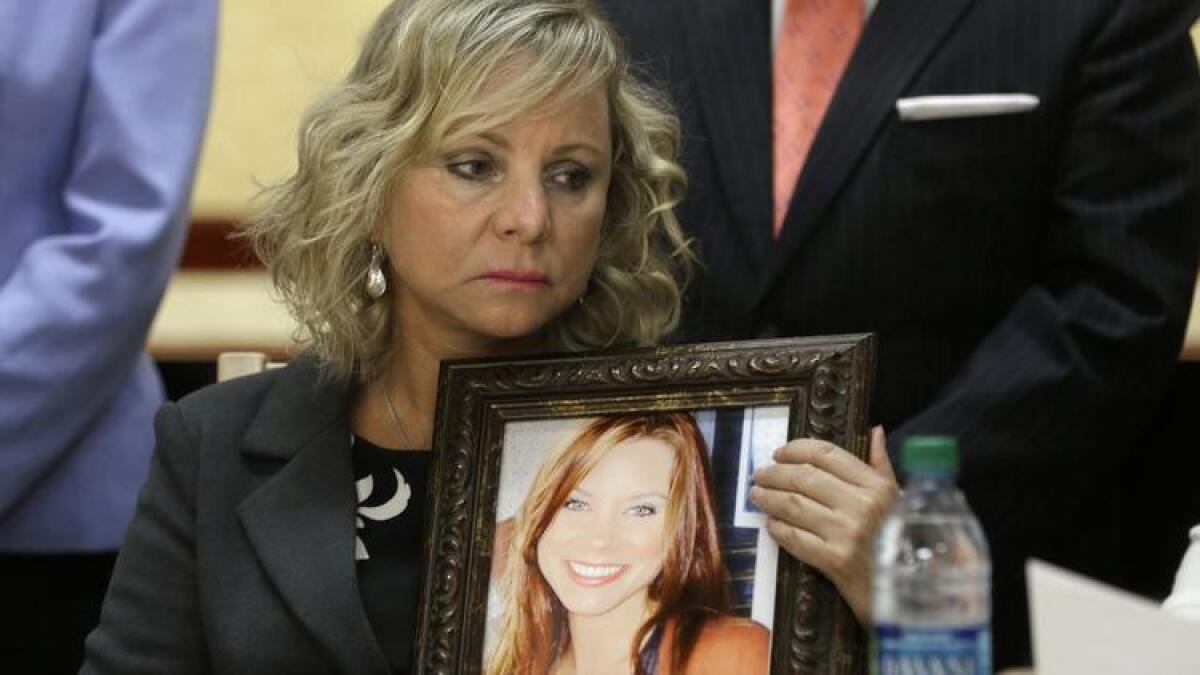
California lawmakers on Thursday adjourned a special session on healthcare, which allows the state’s End of Life Option Act to take effect in 91 days, on June 9.
The law, which allows doctors in California to prescribe lethal doses of drugs to terminally ill patients who want to hasten their deaths, was signed by Gov. Jerry Brown last October, but its effective date was delayed because it was approved in a special session.
The bill had failed to win support during the regular session. At least one prominent supporter of the law died in the months since it was signed.
Having a firm date set when the law will take effect was welcomed in a joint statement Thursday by authors of the measure: Assemblywoman Susan Talamantes Eggman (D-Stockton) and Democratic Sens. Lois Wolk of Davis and Bill Monning of Carmel.
“The End of Life Option Act ensures that terminally ill Californians will not be denied death with dignity,” the lawmakers said. “We are grateful that the law will soon be in effect.”
Brown signed the bill even though he thought it was not appropriate to act on it in a special session called to find financing for healthcare programs.
The approval of the law through “controversial legislative tactics” was denounced again Thursday by Tim Rosales of Californians Against Assisted Suicide.
The group “remains strongly critical of this new law, and its lack of medical oversight and actual patient safeguards,” he said. “We will continue working with our partners including doctors, patients and disability rights organizations to educate those impacted and vulnerable, as well as working to limit the law’s harms and prevent any expansion.”
- Share via
Senate approves raising smoking age to 21 and vaping regulations

The state Senate on Thursday gave final legislative approval to bills that would regulate electronic cigarettes and raise the smoking age to 21 in California, sending them to Gov. Jerry Brown for consideration.
Senate leader Kevin De Leon (D-Los Angeles) called the six tobacco bills approved Thursday, “the most expansive tobacco control legislative package in over a decade.”
Supporters of additional tobacco controls used the special session to advance bills that had bogged down during a regular session, moving them through new committees not controlled by opponents. The bills were approved last week by the Assembly. Most Republicans voted against both bills.
The bill on electronic cigarettes bans their use in restaurants, theaters and other public places where traditional smoking is already prohibited. Sen. Mark Leno, D-San Francisco, said his bill also significantly prohibits marketing the devices to minors.
Sen. Jeff Stone, R-Murietta, said there is concern that electronic cigarettes serve as a “gateway” to the use of regular cigarettes, especially for teenagers. “For the first time, more teenagers use e-cigarettes than cigarettes,” Stone said.
Sen. John Moorlach, R-Costa Mesa, opposed the measure, saying it infringes on freedoms. “Everybody has the right and the freedom to smoke,” Moorlach said.
The Senate also passed a measure by Sen. Ed Hernandez, D-West Covina, that would raise the legal minimum age for smoking in California from 18 to 21. Hernandez said the proposal will save lives because many fewer minors will take up cigarettes.
The senator said “fierce” opposition to the bill by the tobacco industry shows that it relies on a business model “to market and sell this poison to our kids.”
Sen. Joel Anderson, R-San Diego, opposed the bill, saying it would deprive people who return from war a chance to smoke. The bill exempts active military personnel.
If the governor signs the bill, California would become the second state in the country, after Hawaii, to increase the age to buy tobacco products to 21,
The Senate also approved four other tobacco bills, including measures increasing licensing fees for tobacco sales, allowing counties to seek voter approval of tobacco taxes, and expanding bans on smoking at schools as well as and workplaces to include warehouses, gambling clubs, motel lobbies, covered parking lots and other public areas left out of the existing law.
Sen. Bob Hertzberg (D-Van Nuys) withheld his vote on the workplace rule, saying the bill might trip up people who work alone in their home, if a customer shows up.
“This is not about tobacco. This is about writing the laws in a way that works for folks,” Hertzberg said.
Sen. Bill Monning (D-Carmel) said the measure is necessary. “Let’s protect all Californians from second-hand, poisonous smoke,” Monning said.
- Share via
GOP’s Duf Sundheim files to run for U.S. Senate
- Share via
E-cigarette industry leaders meet with Brown administration to oppose new regulations
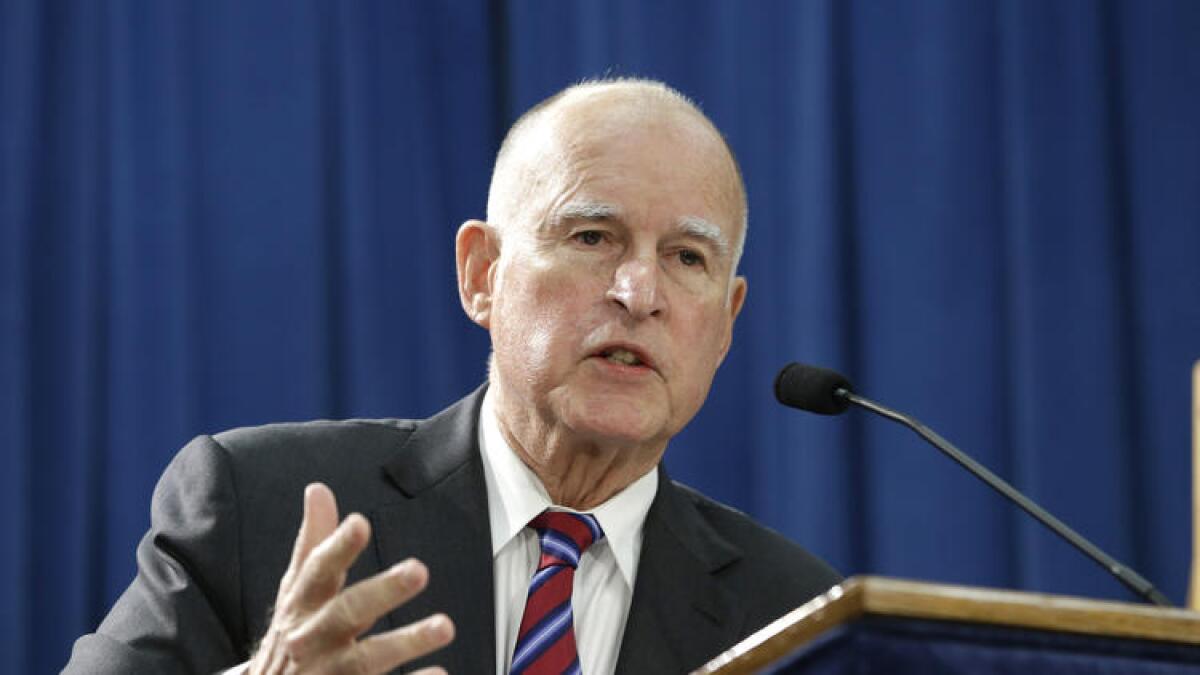
On the eve of a possible final vote to regulate electronic cigarettes, leaders of the vaping industry met privately Wednesday with an aide to Gov. Jerry Brown to lobby for a veto if the measure reaches his desk.
The Senate may vote Thursday on a bill that prohibits use of electronic cigarettes in restaurants, theaters and other public places where smoking is banned.
In a letter to the governor, representatives of the Smoke-Free Alternatives Trade Assn. argued that electronic cigarettes are safer than combustible cigarettes and have been used by smokers to kick the habit.
“Vapor products are not tobacco products because they clearly do not contain tobacco,” said Cynthia Cabrera, president of the association, in the letter to Brown. “It is scientifically impossible to create an equivalent between the risk posed by combusted tobacco and that posed by vapor products because the chemical makeup of the products is entirely different. “
Joshua Krane, an association official, said an aide to the governor asked a lot of questions during the meeting but did not commit to a position on the bill. “They certainly seemed to be receptive to our issues,” he said.
- Share via
Latino icon Edward R. Roybal to be honored with tree in U.S. Capitol
Edward R. Roybal, the pioneering Eastside politician who represented Los Angeles for 30 years in the House of Representatives, will have a red oak tree planted in his honor next week on the U.S. Capitol grounds.
The planting will mark the centennial of Roybal’s birth. He died in 2005 of respiratory failure at age 89.
His daughter, Rep. Lucille Roybal-Allard (D-Downey), will be joined at the planting by House Minority Leader Nancy Pelosi, House Minority Whip Steny H. Hoyer and Senate Minority Leader Harry Reid.
When elected to the Los Angeles City Council in 1949, Roybal was the first Latino to serve on the board since 1881. Throughout his career he was known for an emphasis on social justice and for championing the rights of the underprivileged.
“He was there when others in Washington turned their backs on seniors, the disadvantaged and the poor,” Pelosi said at the time of his death.
The tree will be planted on the south side of the Capitol. It joins a long list of structures and places named for Roybal, including the main campus for the Centers for Disease Control and Prevention in Atlanta and the Edward R. Roybal Institute on Aging at USC.
- Share via
Darrell Issa to talk tech at South by Southwest
Rep. Darrell Issa (R-Vista) will be in Austin, Texas, on Saturday to talk about technology and government at South by Southwest Interactive.
Issa will be on a panel of lawmakers, government agency officials and policy experts titled “Tech and a Modern Government.”
He is a repeat attendee at the annual technology, music and film festival, which has led to Internet gems like this CNN video of Issa talking about the festival while riding in a pedicab.
The Republican chairman of the House Judiciary Subcommittee on Courts, Intellectual Property and the Internet made his fortune designing the Viper car alarm in the 1980s.
- Share via
L.A. County supervisor backs GOP Senate candidate
- Share via
Another soda tax battle ahead?
Alarmed by an obesity epidemic, two state lawmakers on Tuesday proposed a “health impact fee” of 2 cents per ounce on sugar-sweetened sodas and drinks sold in California.
The proposal by Democratic Assemblymen Richard Bloom of Santa Monica and Jim Wood of Healdsburg would add 24 cents to 12-ounce soft drink cans, to be charged at the distributor level.
- Share via
Handing over some regulation duties might be good, says utilities commission chief
The president of California’s Public Utilities Commission sounded like a guy on Tuesday who’s ready to offload some of his agency’s duties.
“There’s a lot of things we do that probably other people could do,” said PUC President Michael Picker during an Assembly overview hearing of the agency’s operations.
What Picker didn’t seem to know is that he was preaching to the choir when it comes to the chairman of the Assembly’s Utilities and Commerce Committee.
Last month, Assemblyman Mike Gatto (D-Glendale) introduced legislation to break up the PUC as it now exists and hand off many of its regulatory duties to other state agencies.
In Tuesday’s hearing, the agency’s top official brought that idea up all on his own.
“They aren’t something we can do effectively,” Picker said in discussing oversight of transportation industries like limousines and ride sharing.
Picker took the helm of the agency in late 2014, appointed by Gov. Jerry Brown following the long leadership of Michael Peevey. The former president’s tenure ended with state and federal investigations into the agency’s operations in regards to private communications with PG&E.
Picker sounded on Tuesday like a guy who might need to lighten his load.
“I am so underwater on a daily basis,” he said in response to one lawmaker wondering why Picker wasn’t well versed on recent legislation to reform the agency.
Gatto, the committee chairman, seemed thrilled to hear Picker suggest that some of the PUC’s portfolio might be better off with other state agencies -- the goal of Gatto’s proposed state constitutional amendment.
“It sounds like an endorsement,” said a beaming Gatto.
Of course, the agency chief also said he was only speaking for himself and wasn’t familiar with Gatto’s specific proposal.
“I’ve been on vacation,” said Picker.
- Share via
White House picks Riverside for tech training program
Several Riverside colleges and businesses are pledging to work together under a White House initiative, set to be announced today, to train 4,000 Riverside residents for tech jobs over the next five years.
SmartRiverside TechHire will bring together the Riverside County Workforce Development Agency, the Riverside Community College District, the Vocademy makerspace and the Greater Riverside Chambers of Commerce with Loma Linda University Medical Center, Zodiac Aerospace, Paulson Manufacturing, Xerox and other local employers.
It is one of 15 TechHire hubs the White House will announce.
The training will include fields such as cybersecurity, data analytics, healthcare IT, web and mobile development, robotics and machining, according to the White House.
Residents or businesses interested in participating can contact [email protected].
Local government and employers in Los Angeles, Oakland, San Francisco and San Jose and three dozen other cities have made similar commitments to tech hiring in recent years.
- Share via
Hillary Clinton backs California farmworker overtime bill
Democratic presidential candidate Hillary Clinton is backing an effort in Sacramento to expand overtime protections to state farmworkers.
The bill, authored by Assemblywoman Lorena Gonzalez (D-San Diego), would give farmworkers overtime after an eight-hour workday and establish a 40-hour workweek. Currently, farmworkers receive overtime after working 10 hours in a day.
Clinton, in a Feb. 29 letter to Gov. Jerry Brown, Senate President Pro Tem Kevin de León (D-Los Angeles) and Assembly Speaker Anthony Rendon (D-Paramount), said the bill builds on the state’s long history of protecting farmworkers.
“I have been committed to our nation’s agricultural workers throughout my career, and I write to convey my strong support for this legislation,” Clinton wrote in the letter. “It reflects our shared commitment to fair and humane working conditions for those whose labor feeds our nation and much of the world.”
Similar bills aiming at expanding farmworker overtime rules have failed twice in recent years, according to Gonzalez’s office. In 2010, then-Gov. Arnold Schwarzenegger vetoed a bill and the next year a bill passed both houses but failed after Senate amendments did not gain the support of the Assembly.
Gonzalez’s bill differs from the prior attempts by phasing in the eight-hour workday over four years.
Gonzalez said her understanding is that United Farm Workers asked Clinton to write a letter in support of the bill.
- Share via
Garcetti, top state officials back Obama in Supreme Court immigration case
Los Angeles Mayor Eric Garcetti on Tuesday waded into the Supreme Court’s consideration of President Obama’s immigration executive actions when he and Democrats from more than 100 cities and counties filed a brief supporting the president.
“This is not about politics as much as it’s about people, and it’s about promises,” Garcetti told reporters by phone. “We want to see cities that are prosperous, not that are picking up the failures of Washington.”
Garcetti said the nation’s current immigration system hurts cities and counties economically because people work for low wages, can’t earn scholarships and access healthcare or are afraid to work with police. Obama’s executive actions would make people in the country illegally feel more secure as they applied for citizenship, he said.
Officials from 24 California cities and counties -- including Davis, Oakland, Sacramento, Santa Ana, San Francisco city and county, San Jose and Sonoma County -- signed on to the brief.
Also on Tuesday, Atty. Gen. Kamala Harris signed on to a brief supporting the president with other state attorneys general, and California business, education, law enforcement and religious leaders filed another supporting brief.
Earlier in the day, nearly all congressional Democrats, including all 39 Democrats in the California House delegation and both the state’s senators, filed their own amicus, or friend of the court, brief.
House Speaker Paul Ryan (R-Wis.), said last week the chamber will vote on filing a brief to urge the court to overturn the president’s broad immigration actions.
The court is scheduled to hear United States vs. Texas on April 18. A decision will likely come right before the court ends its current session in late June.
Texas and twenty-five other states are challenging Obama’s Deferred Action for Childhood Arrivals program, which defers deportation for certain immigrants who came to the United States as children, and his Deferred Action for Parents of Americans and Lawful Permanent Residents program, which defers deportation for their parents as well.
- Share via
GOP challenger in 31st Congressional District
- Share via
Loretta Sanchez makes it official
Orange County Rep. Loretta Sanchez formally filed papers today to run for the U.S. Senate, a final step toward a fascinating intra-party showdown that could last beyond June.
Sanchez was accompanied by reporters this morning on her visit to the Orange County Registrar of Voters office in Santa Ana. This is the final week for candidates to file for election in 2016, and the veteran congresswoman faces a tough race against Atty. Gen. Kamala Harris.
Last month, Harris was overwhelmingly picked by Democrats to receive the party’s official endorsement. Even so, some political observers believe that California’s top-two primary rules could allow both women to eclipse an outmatched field of Republicans and move on to the November general election.
- Share via
Don’t forget prison population woes, Brown urges in ballot measure fight
Gov. Jerry Brown wants California’s Supreme Court justices to consider the strict mandates on the state’s prison population as they weigh his November ballot initiative to overhaul parole and juvenile justice.
On Monday afternoon, the governor’s campaign attorneys filed new documents with a clear message: without the ballot measure allowing more inmates to be paroled, overcrowding will return.
Almost two weeks ago, a Sacramento judge blocked Brown’s parole initiative from gathering voter signatures, agreeing with a group of district attorneys that Atty. Gen. Kamala Harris should not accept the governor’s last-minute major amendments to the measure. Brown immediately appealed to the state’s highest court, and was allowed to begin gathering signatures while the legal issues are resolved.
Last Friday, the panel of three federal judges warned that recent statistics show that the number of people behind bars is again rising. The judges wrote that the state must continue to prove that overcrowding solutions are “durable, and such durability is firmly established.”
Brown clearly hopes that warning will bolster the case that his ballot measure can’t wait for the next statewide election in 2018.
- Share via
The new speaker’s priorities? Poverty, oversight and participation
Assembly Speaker Anthony Rendon, (D-Paramount) outlined three priorities for his tenure in his swearing-in speech Monday afternoon: poverty, oversight and participation.
Poverty: Rendon called the number of California children living in poverty “the single biggest shadow on the Golden State.” In a news conference after his speech, Rendon referred to a recent successful effort to boost tax credits for poor working families and a potential minimum wage increase as specific anti-poverty measures.
Oversight: With a potentially longer time in office than his predecessors because of the loosening of term limits in 2012, Rendon said he wanted to ramp up legislative oversight, specifically of the executive branch. He said he was hoping to work with his GOP colleagues in this area as well as on anti-poverty programs.
Participation: Rendon said that when he was first elected in 2012, he received only 8,700 votes in a district with almost 500,000 people. “It was really hard for me to consider that a win in 2012,” Rendon said. “And I think we need to explore how we can get more Californians involved.”
Rendon opened his speech talking about his background as a poor student who worked graveyard shifts to get ahead before he earned a Ph.D. in aesthetic and political theory from UC Riverside. For more on Rendon’s background, check out my colleague Melanie Mason’s January profile.
- Share via
Assemblywoman Lopez faces fines for campaign, personal finance disclosure violations
Assemblywoman Patty Lopez (D-San Fernando) has agreed to pay $7,500 in fines for violating campaign and personal finance disclosure laws during her 2014 election, according to documents released Monday.
Lopez signed an agreement with the state Fair Political Practices Commission in which she admitted failing to properly file campaign and personal finance statements, failing to deposit contributions into one campaign account, and receiving $1,300 in cash contributions of $100 or more.
Lopez was a political newcomer when she unseated Assemblyman Raul Bocanegra in 2014 and the FPPC case could hurt her as she seeks reelection this year in a rematch with Bocanegra.
The case stems from the FPPC’s investigation of a complaint filed by Rosemary Jenkins, a Democratic activist from Granada Hills and ally of Bocanegra.
The state Political Reform Act prohibits candidates from accepting cash contributions of $100 or more, but Lopez admitted accepting five such contributions totaling $1,300, according to the report released by the FPPC’s enforcement staff.
Campaign filings that detail the amounts raised and spent by a candidate were filed by Lopez with Los Angeles County on time, but three were late getting to the secretary of state’s office, with two not showing up until seven months after the election.
Lopez also improperly paid $4,698 in campaign expenses from her personal funds rather than her campaign committee account, the FPPC report said.
In addition, the report said Lopez and her campaign treasurer, Carolina Perez, failed to deposit approximately $800 in contributions received for two fundraisers selling tamales and papusas into the committee’s bank account.
Lopez attributed poor record-keeping to a “lack of prior experience with the Act and due to lack of funds,” the report said.
Candidates are also supposed to file a report detailing their personal financial investments, but Lopez failed to report rental property she owned, rental income from that property and her spouse’s salary.
In all, she faced five counts alleging violations of the Political Reform Act.
Failure to properly file the campaign finance reports “deprived the public of information regarding the committee’s finances,” the FPPC report said. “Additionally, because many of the transactions were in cash, the full nature and extent of the campaign activity cannot be verified with the available records.”
In imposing fines, commission staff noted that Lopez had previously been fined $400 for failing to timely file two preelection campaign statements for the June 3, 2014, primary election.
Mitigating factors include that Lopez filed some statements with the county registrar, that she cooperated with the investigation and that her campaign spent little money compared with most election efforts.
“The Enforcement Division investigation did not reveal any evidence that Lopez, the committee, and Perez intended to conceal information from the public, and (they) contend that the violations were unintentional,” the investigative report said. “Lopez has since hired a professional treasurer to assist her in complying with the Act’s campaign requirements.”
- Share via
Remembering Nancy Reagan
I covered Reagan up close for 20 years, including as The Times’ White House correspondent.
The first lady had only one agenda — her husband’s legacy.
She became known as “the bad cop.”
- Share via
Everyone thinks Speaker Rendon will be here for a while
The fact came up over and over again during Monday afternoon’s swearing in of new Assembly Speaker Anthony Rendon (D-Paramount): He can be here for a long time.
Thanks to voter-approved changes to legislators’ term limits, Rendon could be speaker for the next eight years -- longer than anyone since Willie Brown. Rendon’s predecessor, Assemblywoman Toni Atkins (D-San Diego), the assemblyman who introduced Rendon, Luis Alejo (D-Watsonville) and Rendon himself all mentioned it during their speeches.
So what does that mean? Rendon said it allows him and his colleagues to wrest some power back from the executive branch, which, he said, gained influence with short-time legislators.
“I think a tremendous amount of power receded from the Legislature,” Rendon said.
One area where Rendon expects to flex his muscle is oversight. He referred to his previous efforts to hold the state parks department and California Public Utilities Commission accountable as examples. He also said oversight was an area of shared interest with his Republican colleagues.
“They’ve worked very closely with us,” Rendon said.
- Share via
Some excerpts from the speech
- Share via
A sign of the times
- Share via
And now, Mr. Speaker
- Share via
Political VIPs here for the big moment
- Share via
Festive mood for incoming Assembly Speaker Anthony Rendon
- Share via
Few Assembly speakers have lasted very long
- Share via
Video: Anthony Rendon sworn in as Assembly speaker
- Share via
Rendon preparing for his moment
- Share via
Nancy Reagan services scheduled
- Share via
Reaction to firing at air quality board
- Share via
Air Quality board ousts top executive
- Share via
Protesters hit Assemblywoman’s event
Assemblywoman Cheryl Brown (D-San Bernardino) hosted a town hall meeting this afternoon focused on the logistics industry and how to grapple with the vast network of trucking and warehouses that is dotted throughout her district.
But halfway through the event, about a dozen protesters donning pollution masks marched to the front of the room, calling Brown a “corporate hack” and criticizing her for not doing more to combat air pollution. They then laid down on the floor in front of her.
Several of her colleagues, including Assemblyman Rudy Salas (D-Bakersfield) and Jim Cooper (D-Elk Grove), co-chairs of the legislature’s moderate caucus, were in attendance at Brown’s event.
Cooper came to Brown’s defense after the protesters left.
Brown, who is facing a tough challenge from fellow Democrat Eloise Gomez Reyes in her reelection race, has been the target of Democrats in recent months after she was one of several moderate members who opposed a provision in last year’s landmark SB 350 bill, which would have slashed petroleum use in the state by half.
- Share via
Want to sound off on money in politics? Your big chance may be here soon
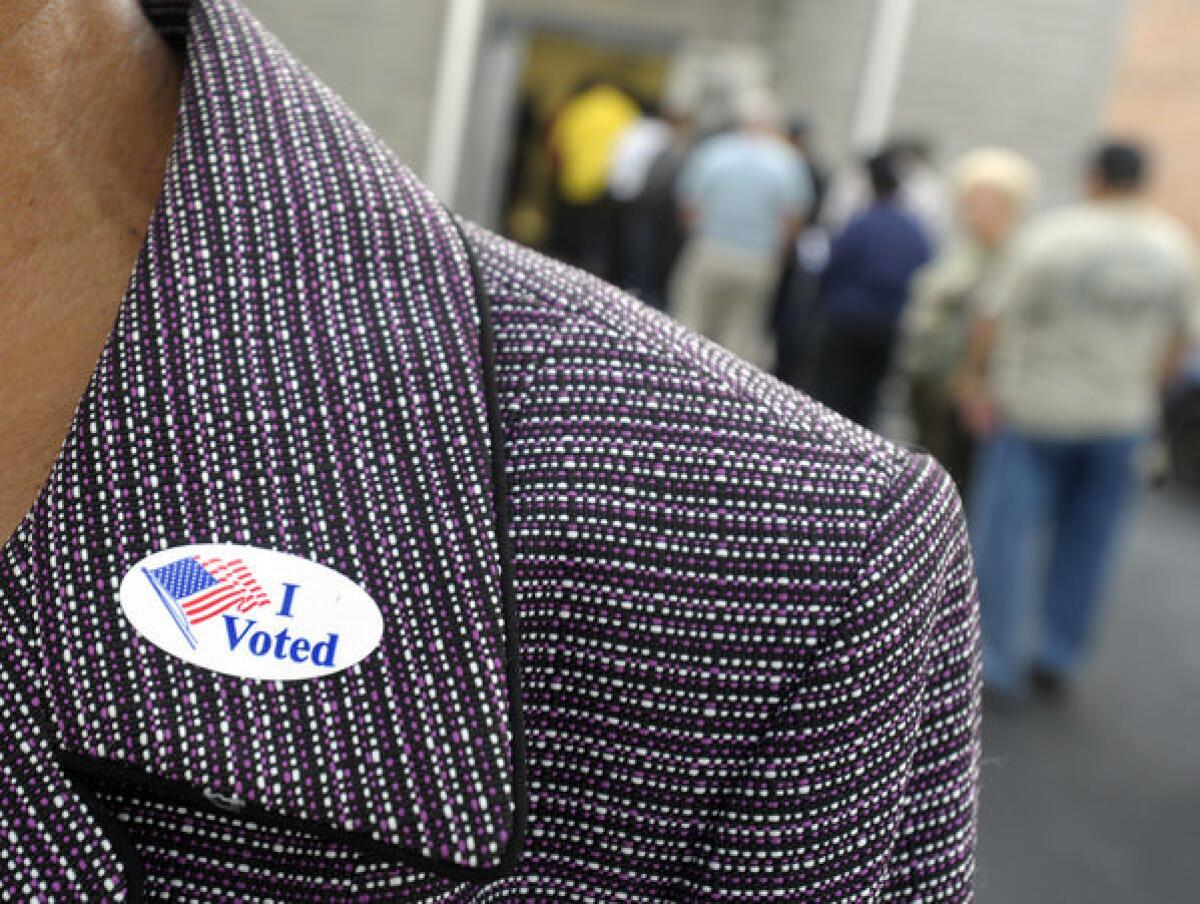
In a political season in which candidates from both major parties decry the influence of unrestricted campaign money, a handful of state senators say it’s time to bring the issue to the ballot and let California voters sound off.
Two years later than expected, that is.
Thursday’s introduction of legislation to place an advisory measure about the Citizens United case on November’s ballot is the latest installment in a saga that dates back to 2013.
- Share via
Smoking-age change foes say it’s unfair since Californians can smoke pot at 18
Republicans opposing a bill that would raise the tobacco smoking age in California to 21 said it creates a conflict in law because 18-year-olds can still smoke medical marijuana.
The Assembly voted Thursday to raise the smoking age from 18 to 21 and sent the bill to the Senate for final action.
“So kids are going to grow to 20 and not be able to smoke cigarettes but they can roll a joint and smoke a joint at 18 years old,” noted Assemblyman William Brough (R-Dana Point) during the floor debate Thursday. “I think that’s inconsistent.’’
The Compassionate Use Act approved by California voters in 1996 not only allows 18-year-olds to get medical marijuana cards allowing them to buy cannabis but also allows the drug to be approved for minors with health conditions.
That is the big difference, according to state Sen. Ed Hernandez (D-West Covina), who wrote the bill raising the tobacco smoking age to 21.
“Medicinal marijuana requires a prescription from a licensed healthcare provider,” Hernandez said.
Assemblyman Rob Bonta (D-Alameda), an author of legislation last year that created regulations for medical marijuana, agreed that it involves “cannabis as a medicine. That’s between a patient and a physician as to whether that is appropriate to address the ailments of a patient.”
Some children under 18 have even been prescribed marijuana to address problems with epilepsy, Bonta said.
The Assemblyman said regular smokers of marijuana may face some of the same health issues facing regular smokers of tobacco. He noted that a separate measure in the signature-gathering stage for the November ballot that would allow recreational use of marijuana requires the consumers to be 21 or older.
“That is very consistent with what we passed on the floor yesterday in the Assembly,” Bonta said Friday.
- Share via
Nonprofit starts rating system: Are bills kid-friendly?

A San Francisco-based nonprofit says it will start rating proposals by California lawmakers as either “for kids” or “against kids,” and it’s starting with a few on the table this legislative session.
Common Sense Kids Action has designated seven bills as kid-friendly, including a proposal that would increase the benefit for paid family leave, another bill that would provide three months of maternity and paternity leave, and a bill that would extend online privacy laws to preschool students. The organization also rated the Senate’s $2-billion proposal to combat homelessness as “for kids.”
“America’s kids are our future and they should unequivocally be the top priority for policymakers from California to Washington, D.C.,” the group’s founder, James P. Steyer, said in a statement.
He added that the group’s rating system “puts policymakers on notice” that they’ll be held accountable for their votes that will affect children.
See the full list of ratings here.
- Share via
Special legislative session on healthcare almost over
- Share via
Local tobacco tax votes OKd by Assembly
The Assembly approved a bill Thursday that would allow counties to seek voter approval of tobacco taxes.
Lawmakers said the bill gives local jurisdictions the ability to raise money to offset the healthcare costs of treating tobacco-related illnesses.
The measure was one of six tobacco bills approved Thursday. Another expands no-smoking zones in workplaces by removing exemptions, and a third would expand tobacco-free zones at all California schools.
The Assembly also gave the state Board of Equalization the authority to set higher annual fees of $265 for tobacco retailers, replacing the current, one-time $100 fee.
- Share via
Boxer joins call for a female U.N. secretary-general
Sen. Barbara Boxer and six other female U.S. senators are asking President Obama to push for a woman to be the next secretary-general of the United Nations.
In the body’s 70-year history, no woman has held the position, which is often the U.N.’s public face. Current Secretary-General Ban Ki-moon’s term is over at the end of the year.
In a letter to the president, the senators noted that the U.N. General Assembly passed a resolution in 1997 that gender and geographic region should be considered when filling the secretary-general position.
“Numerous studies have shown that women’s meaningful representation in decision-making around peace and security issues is key to the effectiveness and sustainability of these efforts,” the letter states. “Additionally, a female secretary-general would bring a different perspective on the numerous challenges facing the U.N. and would help to ensure further dedicated attention to gender throughout the organization.”
- Share via
Local tobacco tax bill passes Assembly
- Share via
Assembly approves e-cigarette regulations
Achieving a breakthrough on the issue after months of political gridlock, state lawmakers on Thursday took a big step toward regulating electronic cigarettes in California.
The state Assembly voted 50-20 to approve a bill banning the use of e-cigarettes in restaurants, theaters and other public places where traditional smoking is prohibited.
The measure by state Sen. Mark Leno (D-San Francisco) previously had been approved by the Senate, but it now must go back there for approval of minor amendments.
“E-cigarettes threaten our health,” Assemblyman Rob Bonta (D-Alameda) said in a floor speech. “We cannot allow our next generations to become addicted to this new tobacco product.”
Republican Assemblyman Matthew Harper of Huntington Beach was among the opponents.
“This bill is an absolute outrage,” Harper said. “It’s trying to define non-tobacco products as tobacco.”
Leno had failed to pass an identical bill through the Assembly during the regular session last year, after the Assembly committee, led by Assemblyman Adam Gray (D-Merced), sought to water it down.
To get around that panel, Leno introduced a new bill as part of a special legislative session on healthcare, which allows selection of a new health committee that subsequently supported the measure.
The measure was fiercely opposed by the Smoke-Free Alternative Trade Assn., which had dozens of members appear before legislative hearings to say it would drive them out of business and remove what they say is a safe alternative to cigarette smoking.
Gray did not like the maneuver around his committee.
“I think bills should go through the appropriate process, which includes committee votes and appropriation and should not necessarily be done in special session,” Gray said before the vote.
- Share via
Assembly approves new regulations for electronic cigarettes
- Share via
Five members of Congress headed to Flint, Mich., to learn about the water crisis
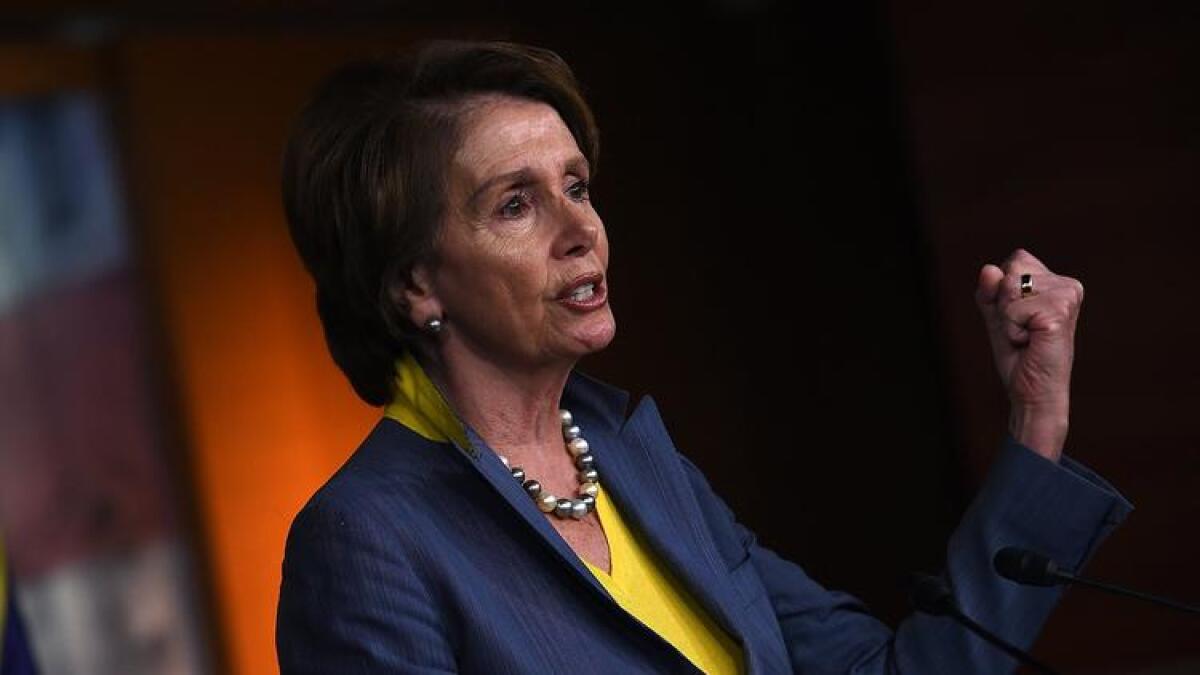
House Minority Leader Nancy Pelosi (D-San Francisco) is scheduled to visit Flint, Mich., on Friday along with California Democratic Reps. Barbara Lee of Oakland, Mark Takano of Riverside, Susan Davis of San Diego and House Democratic Caucus Chairman Xavier Becerra of Los Angeles.
The members are expected to hear from families affected by the water crisis and from federal officials on what the government is doing in response.
Flint’s drinking water became contaminated with lead in April 2014 after the city, while under the control of a state-appointed emergency manager, switched its source to the Flint River as a temporary cost-cutting move and the state Department of Environmental Quality failed to require the addition of needed corrosion-control chemicals.
This is the third trip that Rep. Dan Kildee (D-Mich.) has organized for House members. Last month, Rep. Scott Peters (D-San Diego) joined lawmakers visiting the area.
This post was updated to add Takano.
- Share via
Assembly votes to raise smoking age to 21

The state Assembly voted Thursday to approve an increase in the legal smoking age in California from 18 to 21 after health experts said it would save lives by reducing the number of young smokers.
The measure, which had previously been approved by the Senate but now goes back there for approval of amendments, was supported by a coalition called Save Lives California that included the California Medical Assn. and American Lung Assn., and noted 95% of adult smokers start before the age of 21.
“We know what a killer tobacco products are,” said Assemblyman Jim Wood (D-Healdsburg). “Let’s do something to stem the tide and save millions of lives in the future.”
The measure was approved by a 46-26 vote.
Sen. Ed Hernandez (D-West Covina) introduced the measure in a special session on healthcare after a similar bill bogged down in an Assembly committee last year, amid opposition from veterans groups including the Vietnam Veterans of America – California State Council.
The measure was also opposed by Republican Assemblyman Donald Wagner, who noted 18 year olds can vote and join the military.
“I think this body does a disservice to adults by taking away their rights,” Wagner told his colleagues.
“You can give your life but you can’t buy a pack of cigarettes,” said Republican leader Chad Mayes, who also opposed the bill.
Assemblyman Adam Gray (D-Merced), who chaired the committee that blocked the similar bill, also voted against the bill.
“Eighteen-year-old adults who can enlist in the military and serve and have all the other privileges of adults can decide for themselves” whether to smoke, Gray said.
As a result, Wood agreed to amend the bill to exempt active-duty military personnel.
Still, Republicans tried several failed attempts to block a vote by closing the special session.
“The governor did not call the second extraordinary session to debate the regulation of tobacco, “ said Republican Assemblyman Eric Linder, who said the special session was called to find new financing for healthcare.
- Share via
Assembly passes bill to raise smoking age to 21
- Share via
Republicans try to block tobacco vote
- Share via
Tobacco debate takes the Assembly floor
- Share via
Measure to expand paid family leave heads to the governor
California’s pioneering family-leave law is one step closer to being more lucrative for workers.
A measure by Assemblyman Jimmy Gomez (D-Echo Park) would increase how much workers — particularly those earning minimum wage — are paid when they take time off to care for a newborn or ailing family member.
AB 908 legislation is the result of negotiations between Gomez and Gov. Jerry Brown’s office. It passed the Assembly, 47-0, and now heads to Brown’s desk.
Supporters argued that higher wage replacement would make it more likely that low-income workers would use the program, which is financed through employee payroll deductions.
“Right now, paid family leave is out of reach of many Californians,” Assemblyman Luis Alejo (D-Watsonville) said.
- Share via
Retiring Hahn opens up on being a woman in Washington
Rep. Janice Hahn marked the first week of Women’s History Month by speaking about her experience in Congress at a forum hosted by the Library of Congress.
About 75 people sat in the library’s wood-paneled Member’s Room as Hahn (D-Los Angeles) and Rep. Candice Miller (R-Mich.) answered questions from Library Deputy Director Colleen Shogan about how they got into politics and what Capitol Hill is like for female lawmakers.
First elected in 2010, Hahn has said she is leaving Congress in January because she can have a bigger effect if elected to the Los Angeles County Board of Supervisors.
Miller, who leads the House Administration committee and is currently the only female House committee chairwoman, is retiring after seven terms.
Hahn said a Congress with more women would be friendlier. Women make up 20% of the House and 20% of the Senate.
(California’s 53-member House delegation is 36% women. Both of the state’s U.S. Senators are women.)
Hahn and Miller said partisan rancor has made it harder to recruit women to run for office.
“It’s a little more difficult now, and it’s not good. It’s not good for the country,” Miller said.
Hahn said many women don’t want to put their families through the scrutiny that comes with running for office, or be away from them for the workweek.
Hahn said having other women in Congress to talk with, and occasionally commiserate about schedules and other matters, has made the job easier.
Hahn and several Republican members hold a prayer meeting Wednesday mornings in the Lindy Claiborne Boggs Congressional Women’s Reading Room, the only room in the Capitol named for a woman. Retiring Rep. Lois Capps (D-Santa Barbara) also attends.
- Share via
Kamala Harris’ husband sells off assets
California Atty. Gen. Kamala Harris accepted just a single gift in 2015, a large tin of popcorn from Johnson Publishing Co. of Chicago, and her husband sold off assets just months after they were married, state disclosure records show.
Harris, a Democrat who is running to succeed the retiring Barbara Boxer in the U.S. Senate, reported having assets and compensation with as much as $1 million, mostly tied to her husband’s compensation as a partner in the Venable law firm and his investments prior to their marriage, according to her annual statement of financial interests filed with the Fair Political Practices Commission.
Harris and Douglas Emhoff, who heads Venable’s Los Angeles office, were married in a private Santa Barbara ceremony in October 2014.
All of the assets were sold after Harris announced she was running for Senate.
According to the report, Emhoff’s compensation from Venable was between $100,000 and $1 million in 2015. He also sold his financial interest in Citizens Lanier Investors, a Delaware-based parking lot investment company, for between $10,000 and $100,000 in April.
The report also stated that stock holdings in Emhoff’s individual retirement account, which “were funded prior to marriage,” were sold in March 2015. Those stocks were worth between $66,000 and $330,000 and included investments in companies such as Citicorp, Wells Fargo, Valero Energy, Comcast, American Water, Walt Disney Co., Hess Corp., Monsanto and Nike, the report showed.
Harris’ spokesman David Beltran said the proceeds from the asset sales were reinvested in an IRA mutual fund.
- Share via
Momentum builds in the Capitol for vote on stalled tobacco bills
Proponents of a slate of tobacco regulation measures are pushing for the bills to come up for a vote as early as Thursday, resurrecting a thorny legislative battle that ensnared the California Assembly last year.
The anti-tobacco package, which includes raising the smoking age from 18 to 21 and regulating electronic cigarettes, failed to come up for consideration on the Assembly floor last year in the face of discord within the Democratic caucus.
But the bills still remain viable as part of a special legislative session on healthcare, convened to tackle a revamp of a tax on healthcare plans. That tax package was approved earlier this week.
Now, legislators and anti-smoking advocates want the tobacco bills to be revived -- and quickly.
“Our tobacco package has been on the [Assembly] floor since August. It’s time for a vote,” said Sen. Ed Hernandez (D-West Covina), who authored a bill to raise the smoking age.
The question of whether to bring up the bills was the subject of the Assembly Democratic caucus’ weekly meeting on Tuesday. Both Speaker Toni Atkins (D-San Diego) and incoming Speaker Anthony Rendon (D-Paramount) voiced support for the measures, according to multiple sources familiar with the discussion who did not want to be identified discussing internal caucus matters.
But others in the caucus have reservations about the proposals as well as objections over process.
Assemblyman Adam Gray (D-Merced), who chairs a committee that blocked some of the tobacco bills during last year’s regular session, said he was mostly supportive of the proposals but concerned about raising the smoking age and how the legislation would define an electronic cigarette.
Gray is also concerned about the bills being taken up in special session, allowing them to be fast-tracked without following regular procedure.
“I think bills should go through the appropriate process, which includes committee votes and appropriation and should not necessarily be done in special session,” he said, acknowledging that he felt the same way about the right-to-die legislation that he ended up ultimately supporting.
Assemblyman Marc Levine (D-San Rafael), who supports the tobacco regulation measures, said he believed the bills should be put up for a vote on Thursday.
The caucus “should let the world see who wants reasonable control on tobacco,” Levine said.
The bills up for consideration all require a simple majority vote to pass. Proponents had originally sought a tobacco tax measure -- which would have required a two-thirds vote -- but have since pursued a ballot initiative for the tax hike.
- Share via
These are the lawmakers who went to a lavish Maui conference. Here’s who paid.
Twenty-one state legislators on Wednesday disclosed that they attended a conference in Maui last November that was paid for by a non-profit group funded by special interests including the oil industry and state worker unions.
Public outrage over the annual event has sparked legislation that would bar lawmakers from accepting such travel paid for by those seeking favor at the Capitol and to require more sunlight on who is providing favors to legislators.
The six-day conference hosted by the Independent Voter Project is held annually at the Fairmont Kea Lani resort, where rooms go for $365 or more a night, but lawmakers who have some of their expenses covered by IVP did not have to disclose them for months, under state law.
Democratic Assembly members who went to Maui included Rob Bonta of Alameda, Cheryl Brown of San Bernardino, Nora Campos of San Jose, Jim Cooper of Elk Grove, Tom Daly of Anaheim, Mike Gipson of Carson, Adam Gray of Merced, Chris Holden of Pasadena, Reggie Jones-Sawyer of Los Angeles, Evan Low of Campbell, Jose Medina of Riverside, Sebastian Ridley-Thomas of Los Angeles, Freddie Rodriguez of Pomona and Tony Thurmond of Richmond.
Republican Assemblymembers who made the trip include Assemblyman Frank Bigelow of O’Neals, Donald Wagner of Irvine and then-Republican leader Kristen Olsen of Modesto.
Democratic Sen. Bob Wieckowski of Fremont also attended, as did Republican Senators Tom Berryhill of Modesto and Anthony Cannella of Ceres.
New Republican leader Chad Mayes of Yucca Valley also attended, but did not accept reimbursement from the non-profit.
The costs varied. Bonta reported receiving $3,082 in travel expenses from IVP.
Sponsors of the event, many of whom paid $10,000 or more, included the Western State Petroleum Assn., Shell Oil, Sempra, tobacco giant Altria, payday lender Advance America, Anheuser Busch, AT&T, the California Cable and Telecommunications Assn., Koch Industries, VISA, Walmart, and the California Correctional Peace Officers Assn., according to organizers. Many sent lobbyists or representatives to rub elbows with the elected officials poolside or on the golf course.